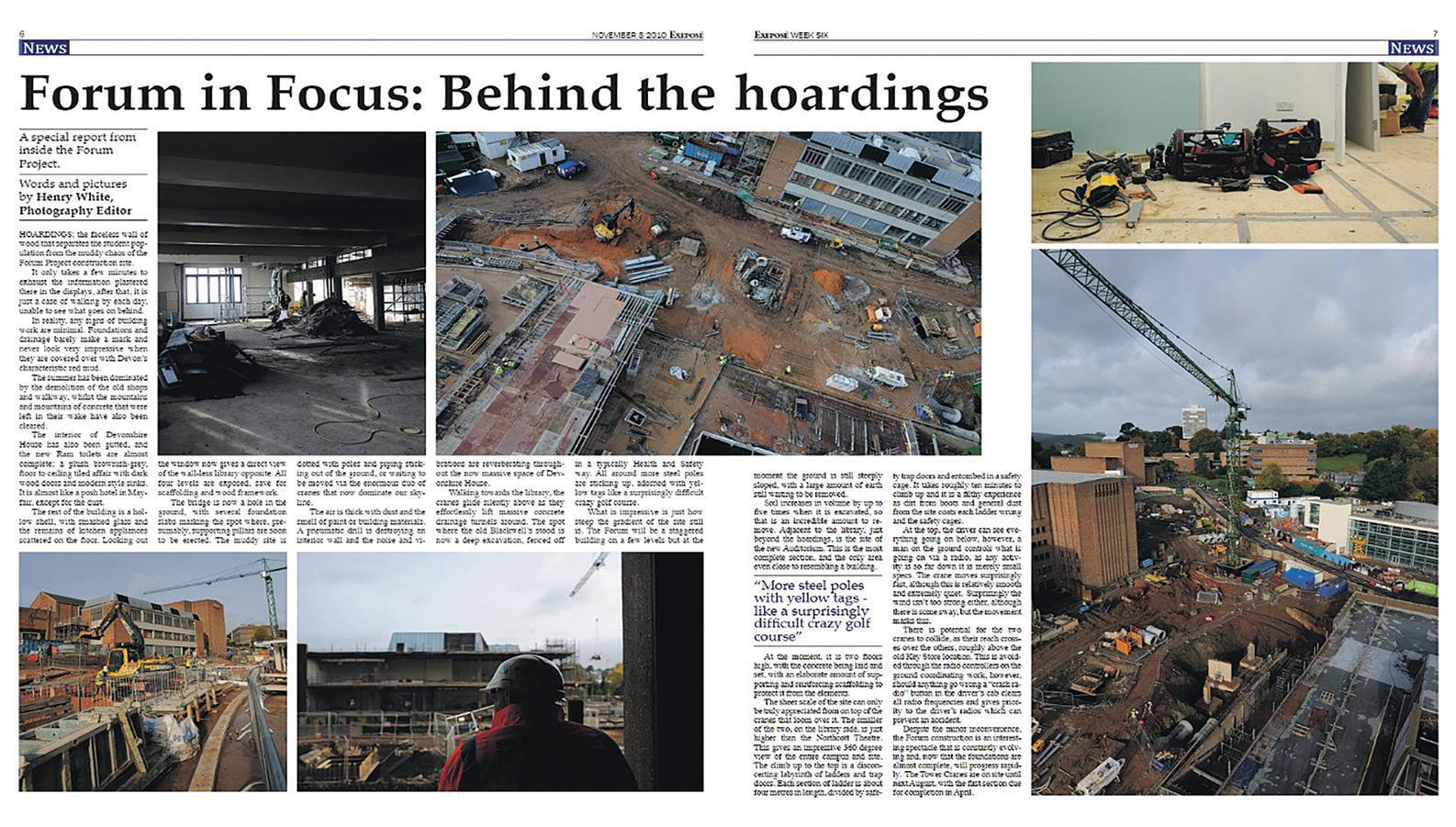
THE UNIVERSITY OF EXETER’S INDEPENDENT STUDENT NEWSPAPER SINCE





been impacted by the industrial action.”

Charlie Gershinson Deputy Editor
LAST year’s Industrial Action Compensation Scheme cost the University over £1.5 million, it has been revealed.
According to a Freedom of Information (FOI) request obtained by Exeposé, the University spent a grand total of £1,567,300 on the 2022/23 Industrial Action Compensation Scheme.
The Scheme was created in the aftermath of the 2022/23 industrial action by the Exeter branch of the University and College Union (UCU) which saw a marking and assessment boycott and strikes. The Scheme served to “provide compensation as a gesture of good will to students who have

A total of 4,700 students claimed compensation from the University, including 4383 undergraduates and 317 postgraduate taught students. The largest amount given was £2000 while the smallest was £100. The median amount given was £750 but the most common figure was £150.
When asked for comment, a spokesperson from the University said, “the University’s commitment to protecting students’ learning outcomes was the first priority throughout the 2022/23 academic year’s period of national industrial action. While every effort was taken to mitigate the disruption to our students from strikes and/or the Marking and Assessment Boycott, inevitably some were impacted as a result.
“The Industrial Action Compensation Scheme was therefore introduced to provide compensation as a gesture of good will
to impacted undergraduate and postgraduate taught students. Each application under the Scheme was assessed to determine the impact of each individual circumstance, including lost learning and any mitigation measures that were undertaken, such as provision of alternative learning materials .
“Each case was considered on its own merits, and the level of any compensation offered through the scheme followed the good practice guidance as set out by the Office of the Independent Adjudicator (OIA).”
A spokesperson from the Students’ Guild said, “we are aware of the challenges our students have faced due to the 2022/23 industrial action. As your Students’ Guild, our priority is always to ensure your learning outcomes and university experience are protected as much as possible during difficult times.
“While the introduction of the Uni-
versity’s Industrial Action Compensation Scheme was a step towards recognising the disruption many of you experienced, we understand that this is just one part of what’s needed to support you. We promoted the scheme when it was open and encouraged students to apply, as part of our commitment to advocating for all students who’ve felt the impact of these events. We remain dedicated to ensuring that the University is proactive in addressing any ongoing concerns related to your studies and wellbeing.
“Our work isn’t done. Your Education Officer, Sebastian Racisz, hopes to continue working with relevant groups and the University to ensure your voice is heard in all future discussions. As ever, the Guild is here to listen, support, and fight for the best possible outcomes for all Exeter students.”
Gracie Moore and Agata Koralewska
Editor-in-Chief and Deputy Editor
LA Lola, one of Exeter’s many international food restaurants, opened in 2023 and has recently closed down, following the owner’s claims of continuous antisocial behaviour in front of the business, and attacks based on his nationality. An announcement can be seen displayed on its window, stating that “the business will remain closed until the Devon and Cornwall Police or the
Exeter City Council can ensure the safety of our customers and staff”.
Exeposé spoke to owner, Francisco Montes, to discuss the events. The assault that took place on the 8th September and left the owner injured was not the first incident, but it led to the venue’s closure. He stated that drugs were consumed regularly near the front door, obstructing the entrance and scaring potential customers away. The nearby telephone booth is not in service and it has become a regular hangout spot for drug consumers. The owner expressed that him and his partner felt sca-
red when working at the restaurant or going home. So much so, his partner left the business as she felt so unsafe.
Francisco believes these attacks are xenophobic as people often shout remarks at him such as “go back to your f*cking country” and have been seen on CCTV threatening him with knives as well as throwing eggs at the front entrance of the restaurant. When the owner showed signs of resistance, they went as far as to break his personal property, such as outside tables or chairs.
When asked about the response from the police, Francisco claims they have not attended the scene even two hours after calling and have even said that they have lost the CCTV and mobile phone footage he provided, meaning they couldn’t continue the investigation. By time of printing, the police had not commented on this claim. As a response, Sector Inspector Nathan Johnson said that the police have been investigating this, as well as a separate incident of a racially aggravated public order offence concerning the same premises which occurred in April 2024.
Continued on page 4
Editors
Print: Gracie Moore and Amy Rushton
Online: Callum Martin and Katie Matthews
Print Deputies: Charlie Gershinson, Rosie PetersMcDonald, Agata Koralewska
Online Deputies: Emily Roughton and Amberly Wright editors@exepose.com
News Editors
Print: Gracie Moore, Amy Rushton, Charlie Gershinson, Rosie Peters-Mcdonald and Agata Koralewska Online: Shagnick Bhattacharya news@exepose.com
Features Editors
Print: Eleanor Rogers
Online: Michelle Chung features@exepose.com
Climate Editors
Print: Charlie Gershinson
Online: Callum Martin and Katie Matthews
Comment Editors Print: Tom Richardson Online: Sophie Zoltowski comment@exepose.com
Satire Editors
Print: Agata Koralewska Online Caspian Davies
Lifestyle Editors
Print: Anna Spencer
Online: Amberly Wright lifestyle@exepose.com
Arts + Lit Editors
Print: Judy Dodd and Kayleigh Swart
Online: Emily Sara Rizzo artsandlit@exepose.com
Music Editors
Print: Harry Morrison and Brooke Taylor
Online Zandie Howells music@exepose.com
Screen Editors
Print: Pollyanna Roberts and Charlie McCormack Online Bronwyn Payne and Dumebi Jibunoh screen@exepose.com
International Editors
Print: Henry Anderson Online: Magdalena Kanecka and Annabel Jeffery
Sci-Tech Editors
Print: Rosie Peters-McDonald Online Daniel Grayshon sciandtech@exepose.com
Sport Editors
Print: Eloise Grainger and Ben Scott Online: Callum Martin and Katie Matthews




@exepose
@exepose
facebook.com/exepose
issuu.com/exeposeexeter
WELCOME back! We hope you had a lovely reading week, whether you went home or stayed in Exeter. A new half of the term means new and exciting articles, and this edition is full of them. As always, if there's an important issue at the University or in Exeter you think we've missed, please email us at editors@exepose.com.
In this issue, News covers Exeter's strides to raise money for Movember, (Page 6), Extinction Rebellion protests on the High Street (Page 5), Exeter's new bishop (Page 3) and more.
Climate looks at the Parlementarians' Guide to Climate Change (Page 10) while Satire says farewell to Marmite Peanut Butter (Page 14). Over in Exhibit, Lifestyle explores Movember activism (Page 16) and Arts and Lit are in conversation with bestselling author, Kathryn Aalto (Page 18), along with an interview with LitsSoc (Page 19). Screen review Megalopolis (Page 22) and discuss women in horror movies (Page 23). If you are interested in articles in translation, in International, Shagnick has written an article in Bengali regarding the resignation of the former prime minister (Page 27). Sci-Tech covers a recent AI chatbot controversy (Page 28), and discusses the events of Hurricane Milton (Page 29). Also in this edition, Sport writers discuss indoor sports at Exeter for rainy days (Page 30) and cover
Exeter's loss at rugby varsity (Page 32). We love to see new members getting stuck in and writing articles for us so if you have any questions about joining the paper, please check out our socials @exepose. We hope you enjoy reading this issue and a huge thank you to all our writers, editors and proofers!
Gracie and Amy




2023 Best Publication
2023 Best Publication in the South West




Visa bonanza
AT the 11th edition of the 'Salon pour la promotion des études francaises', French Ambassador Thierry Marchand has announced some life-altering plans for Cameroonian student visa allocations. Recognising that "Student visas are a crucial part of the relationship between France and Cameroon," the French government plans to increase the visa quota for Cameroo nian students wishing to study at French universities to 4,300, an increase of 10 per cent since the previous academic year. The new measures also hope to streamline the visa application process by seeing a reduction in visa appointment waiting times by up to two weeks. This comes at a pivotal time, as over the last few years, growing diplomatic tensions have emerged between France and Africa (particularly West Africa) due to visa restrictions as a result of political instability in various parts of the continent.
Limit to number of international students studying in the Netherlands

DUTCH Minister of Education, Culture and Science Eppo Bruins has recently brought a policy to the House of Representatives which would limit the intake of international students by a third and save the government €293 million. The right-wing government’s plans also include a reduction in the number of degree classes taught in English, so that no more than a third of classes in most degrees will be taught in languages other than Dutch. Universities themselves will be required to apply caps on the number of students in nonDutch classes, and face funding cuts if they do not reach desired outcomes. The move has sparked protest across the country, most notably from WOinActie, the national movement of university staff and students. “This approach will impoverish education,” Van den Berg, head of the Universities of the Netherlands organisation, argued.
Complicated grade conversion is limiting student mobility
STUDY abroad has been a popular way for students to expand their university experience as they can participate in new cultures and meet new people. However, this process isn’t always easy. University World News reports that study abroad numbers have fallen by 27 per cent in the last decade. There are many factors for this, such as the rising cost of living and the pandemic. How ever, another issue stu dents face is the complex system of grade conversions. University World News reports that this complicated system is cause for limiting student mobility. Existing tools such as the European Credit Trans fer and Accumulation System are often complex and make the process for students even longer. As there is no standardisation of grades between countries, trust between institutions is a key part of this process. However, this means there are no clear guidelines for students applying for these programs, which for many can lead to discouragement from applying.
American universities under Trump's presidency

N the US front of higher education, universities have had many fears and doubts over Donald Trump's victory in the recent election. Described as a “frontal attack” by the University World News, many Republicans including Trump have viewed universities across the nation as an elitist institution. Challenges from this new leadership could see enrolment declines, rising tuition fees and political divisions over the position on universities. During Trump's first tenure, some policies included anti-immigrant rhetoric, cuts to research funding and there were even attempts to curtail student loans. From this, many universities and academics are fearing that the new leadership will see an intensity placed on original policies, plus restricting academic freedom, limiting research, and targeting international students. When the inauguration comes in January 2025, we should get a clearer direction as to Trump's policies on universities.
ON Halloween night, police responded to Sidwell Street in Exeter after reports that an intoxicated man had assaulted a civilian and showed the intention of assaulting another. DevonLive reported that the man, a local in his 40s, was arrested at 6:20pm on suspicion of showing aggression towards members of the public. Devon and Cornwall police stated that the suspect was taken to the hospital to be checked over and shortly after was taken into police custody. Costumeclad onlookers widely observed the
Amy Rushton Editor-in-Chief
Tevent with one on-looker describing the street as “packed”. There have been no new updates on the incident.
Unfortunately, this incident is only one of many similar incidents on the notorious street. Often referred to by students and locals as one of the most dangerous streets in South West England, Sidwell Street is no stranger to instances of crime, especially when alcohol is involved. Reports and evidence of drunken activities and disturbances on the street are everincreasing. Paul Greaves, a senior reporter for DevonLive, highlights the near-daily instances of public intoxication on Sidwell Street. Starting early in the morning and continuing
well into the night, drunken men and women gather in various hot spots on Sidwell Street and Halloween night is no
exception. Students, locals and visitors in Exeter are advised to remain vigilant and cautious when walking through Sidwell
Street, especially late at night or on crime-prone nights such as Halloween.

UITION fees are set to rise next autumn for the first time in eight years. In their first budget, the Government has announced plans to increase annual payments to £9,535 per student — an increase of £285, or 3.1 per centsimilar to the current rate of inflation.
Education Secretary, Bridget Phillipson has also announced a parallel increase to student maintenance loans of up to £414
extra per year for students from low income families. She stated
“This government’s mission is to break down barriers to opportunity, which is why we are doing more to support students struggling with the cost of living despite the fiscal challenges our country faces.
“The situation we have inherited means this government must take the tough decisions needed to put universities on a firmer financial footing so they can deliver more opportunity for students and growth for our economy.”
This announcement has been met with mixed reaction, in part due
to Labour’s previous policy to scrap tuition fees altogether. The University and College Union (UCU) has condemned the increase as “morally wrong”, as has the National Union of Students (NUS) with vice-president Alex Stanley stating students are being asked to “foot the bill to literally keep the lights and heating on in their uni buildings and prevent their courses from closing down”. However, others have argued this is a necessary change in the current climate of Higher Education in which 40 per cent of universities are expected to run budget deficits this year and many face risk of closure. Vivienne

Charlie Gershinson Deputy Editor
THE new Bishop of Exeter, the Right Reverand Dr Mike Harrison, was enthroned at Exeter Cathedral last week.
The service, which took place on the 2nd November also known as All Souls Day, saw Bishop Harrison anointed as the 72nd Bishop of Exeter. The service began with a procession from the Guildhall to the Cathedral Green where he was
Stern, executive of Universities UK stated “Today’s decision cannot have been easy for government, but it is the right thing to do.
“A decade-long freeze in England has seen inflation erode the real value of student fees and maintenance loans by around a third, which is completely unsustainable for both students and universities. Keeping pace with inflation stops the value of fees going down year after year.”
A statement from the Exeter Student’s Guild read “With the cost of living continuing to rise, it’s clear students shouldn’t have to bear the brunt of funding gaps in Higher Education. Tuition fee increases and limited maintenance loan adjustments aren’t enough to cover the real challenges you’re facing. As your Students’ Guild, we’re here to advocate for you, to call for a fair solution, and keep pushing the government to step up and provide support students need and deserve.
“In our recent survey of over 800 students, we found that 29 per cent of students feel financially insecure, spending a monthly average of £722 on basic living expenses (accommodation, bills and food), with 49 per cent of students left with as little as £100 at the end of the month. Of those
greeted by over 100 members of the clergy. In-keeping with tradition, before he could be enthroned, the Bishop struck the Great West Door and was questioned with the words “we welcome you. Who are you and why are you here?” before answering “I am Mike, a servant of Jesus Christ.”
The bishop was then anointed with oil and presented with the Exeter crozier, which is passed from bishop to bishop. He said during his sermon, “when you sit on the actual bishop’s throne you feel a bit small, and maybe that is the point. This isn’t the kind of ministry that
you can do in your own strength.
“Exeter’s medieval throne is nearly 18m high. It forces us to direct our gaze skywards, becoming alert and attentive to the God who is brimming over with the desire to engage with us… it reminds us that we are spiritual beings, and we are not alone.” At the end of the service, Bishop Harrison said a prayer of blessing for the people of Exeter and Devon. Bishop Harrison said that he hoped that his Enthronement Day would be about Devon, its churches and communities “in all their diversity.”
that are financially insecure, 80 per cent of students reported a negative impact on their mental health and 65 per cent on their ability to socialise.
“Home tuition fees, paid directly to the University by Student Finance, will also increase by 3.1 per cent, totalling £9,535 per year. Students won’t feel the impact of this increase right away. Repayments stay the same month-to-month and, unless your loan’s paid off sooner, any remaining balance will be wiped after 40 years.
“Let’s be clear — this isn’t a sustainable solution. It’s unfair to ask students to cover the rising educational costs. The government must step in with a stronger, more consistent funding model for Higher Education. Rising costs must be addressed by those in power to ensure you can focus on what truly matters — your education and wellbeing.
“We’re working alongside University leaders, MPs, and student groups to demand change. Our recent collaboration with MP Steve Race is just one part of our push for increased government action, grants and funding, because we believe it’s up to the government — not students — to tackle these systemic funding issues.”
You can read the full statement on the Exeter Students’ Guild website.

“If I had a child in another country, I wouldn’t send them to study in Exeter”
Continued from the front page
"
During the investigation, a suspect was identified and is currently on police bail. He is due to answer bail in November. “The local neighbourhood team have been involved in numerous conversations, where relevant safeguarding and crime prevention advice has been passed. We take all incidents where individuals appear to have been specifically targeted very seriously. In order for us to take robust action, victim engagement is paramount so that we can build evidence and carry out further enquiries. The neighbourhood team continues to prioritise tackling anti-social behaviour in the City Centre. We join our partners in recognising the negative impact of this antisocial behaviour which is caused by a minority of individuals.
“Although police alone cannot tackle this issue, we do have a role to play in creating a safer city and as such have partnered with InExeter (Business Improvement District) to create ASB
action plans for both Sidwell Street and Cathedral Green. The location of this incident, (South Street and Fore Street) is subject of a third action plan starting on Monday 16 September.
“We have increased our presence by increasing time on foot patrol in the city and have introduced mobile police stations from which officers can complete paperwork and still be visible.”
Devon and Cornwall Police also went on to add that since starting in May, over 300 hours of hotspot police patrols have resulted in the attendance at 70 ASB incidents and 18 arrests in Exeter. They say that the introduction of a Community Safety Team is a real game changer for Exeter.” Francisco brought into question his safety as an immigrant in Exeter.
He told Exeposé “if I had a child in another country, I wouldn’t send them to study in Exeter.” He also stated that he had no plans to reopen La Lola until the police could firmly guarantee his safety.

Freedom Society invites “race realist” external speaker
Amy Rushton Editor-in-Chief
LAST week, the Freedom Society welcomed Nathan Cofnas, previously a philosophy researcher at the University of Cambridge, to talk on “Woke Academia and the Threats to Academic Freedom”.
Cofnas, who was fired from Emmanuel College, Cambridge after claiming in a blog post that meritocracy would see the number of black Harvard professors drop to almost zero, has been described as a “race-realist”, calling for the “preservation of racial distinctions” in society.
In statements which have been likened to eugenics, Cofnas argued there was ‘genetic evidence’ for IQ differences between ethnic groups and that in a true meritocracy, black people “would disappear from almost all high-profile positions outside of sports and entertainment”. This comes as race ‘science’ has slowly been revived in certain wings of academia; the idea that some races are genetically superior has its roots in the eighteenth century, and despite being thoroughly debunked, numerous academic institutions have been forced to grapple with
the rise of eugenicist ideas in recent years, leading to fears of legitimising such beliefs by providing a platform.
Cofnas’s remarks sparked student and staff protest across Cambridge. The Cambridge branch of the University and College Union (CUCU) stated “Cambridge UCU unequivocally condemns all racism within our university and in the world at large. We are particularly dismayed to see how Dr Nathan Cofnas, Leverhulme Early Career Fellow at Emmanuel College and the Faculty of Philosophy of the University of Cambridge, promotes a discredited, ‘scientific’, ‘biological’ understanding of ‘race’ and associated abhorrent ideas regarding the assessments of groups and their social positions.
“This is not only a form of race pseudo-science, but also of eugenics, which have both caused unspeakable harm in the world and should be actively fought under any circumstances. It is for these reasons that there is an awareness within the scientific community about the ways in which fascist and white supremacist groups appropriate and misuse scientific research and language in the way Cofnas has done.”
Cofnas was dismissed from Emmanuel College for breaching “the College’s core values and
mission”. As such, he spoke to Freedom Society on “the current state of free discourse in academic institutions and the broader implications for scholarly independence”. This was approved under the Students’ Guild and University External Speaker Framework, which outlines process and procedures required for external speakers — any individual or organisation who are not a current University of Exeter member of staff or current student invited to provide a viewpoint, or speak, on campus or virtually.
A Freedom Society spokesperson said “Freedom Society stands firmly for freedom of speech and academic liberties. Therefore, we believe that the dismissal of Nathan Cofnas from Emmanuel College was both unfair and unjustified.”
A Spokeperson for the Student’s Guild stated “We’re aware that the student-led Freedom Society hosted an event on 4th November with speaker Nathan Cofnas. This event was reviewed and approved through a joint Guild and University External Speaker Framework, which risk assessed the event and put mitigations in place to balance both our duties of freedom of speech and duty of care to our students. This was not without consideration for the safety and
welfare of our student community which remains paramount.
“As your Students’ Guild, we support freedom of speech. We want to foster an environment where our members can participate fully, feel able to question and challenge, express new ideas, discuss controversial opinions within the law — all without fear of intolerance or discrimination. We believe this is an integral part of university life. The role of the Guild is to facilitate student-led groups to do this through the organisation of events and activities, such as the one hosted by Freedom Soc.
“We understand the concerns raised by some students regarding
the controversial views and approach of the speaker, however, they are not illegal. We only consider stopping events if there are safety risks or if the content could break the law, even after taking precautions.”
A spokesperson for the University of Exeter said: "Student-organised events such as this allow participants to debate and oppose topics that others may not necessarily agree with. The University of Exeter is committed to the protection of freedom of speech and events will go ahead providing they are within the law and held in a safe and considerate manner.”

Amy Rushton Editor-in-Chief
AST week, Extinction Rebellion (XR) activists protested the Exeter Office of Howden Insurance on Exeter High Street, resulting in the business closing temporarily. This comes as escalating risk of flooding across
Devon has heightened the pressure on companies investing in oil and gas.
XR activists dressed in lifejackets staged a ‘die-in’ outside the office in order to draw attention to the risk posed to homes, businesses and livelihoods across Devon by continued carbon dioxide emissions from fossil fuels, which they state is driving the climate breakdown. The emphasis on flooding is particularly timely given
the recent deaths of over two hundred people in flash floods in Spain — a risk XR argues Devon also faces following weather warnings and flood alerts from the Environment Agency.
XR’s Nationwide ‘Insure Our Survival’ Campaign calls on the insurance brokers such as Howden and AIG, to sever ties with the oil and gas companies fuelling climate breakdown. Beginning
in London before spreading across the rest of the country — including Exeter — protests staged demonstrations outside insurance broker offices across the UK.
Andy Extance, a spokesperson for XR stated “Insurance is the weak spot that could stop the fossil fuel industry from digging and drilling for more and more of the oil, gas and coal driving the accelerating climate

crisis. Without insurance, the fossil fuel criminals will have to stop their planet-wrecking operations because they can’t afford the financial costs if something goes wrong. By effectively insuring the climate emergency, the insurance industry is helping create the extreme weather that is flooding our homes, destroying our food supply and threatening to kill billions in our lifetimes.
“We’re here at Howden today because they are enabling fossil fuel projects that are destroying all of our futures. We demand Howden and the entire insurance industry immediately stop insuring all new oil, gas and coal projects — and we’ll keep coming back until they do.”
He added, “We know the insurance industry is listening. So we say: dump all new oil, gas and coal now — or we’ll be back.”
Howden are yet to issue an official statement on the protest at the time of writing.
Image:University of Exeter

Eloise Grainger Sport Editor
THE Forum building has won the ‘Building Resilience — Buildings that have stood the test of time’ Award at the Education Estates Awards 2024.
The award event, held in Manchester, is to celebrate ‘excellence and achievement in the education sector’ and recognise the contribution of various people and organisations that make learning spaces possible.
The Forum building is located in the heart of the University of Exeter’s Streatham Campus and is a hub for students — it is a space for learning, studying, and socialising. The aim
was to create a student focused environment by providing one central place for students to find support services. It houses important facilities such as the Forum Library, the Career Zone, and the two Exploration Labs.
It was officially opened in 2012 by Queen Elizabeth II and is recognised as one of the ‘pioneering UK higher education projects’ that views the students as customers.
Since opening, the university has experienced increasing enrolment numbers year on year. The Forum is a space to accommodate these growing numbers, but the building itself is a big attraction for prospective students and the community.
The award noted some key features and achievements of the Forum: the
iconic and unique timber grid-shell roof design is a notable element of the university’s architecture — it is instantly recognisable. The Forum has also been acknowledged for helping to keep the university within top 10 national rankings by providing an attractive learning environment. On a campus that has been heralded as one of the greenest in the UK it means the sustainability of its buildings must be up to standard. The Forum achieved a 130 per cent increase in area with ‘only a 40 per cent increase in energy consumption’ and the University is working to further enhance the environmental performance of the building within the context of achieving Net Zero Carbon.
Agata Koralewska Deputy Editor
THE University of Exeter has introduced a new solution for international students that are looking to rent a flat or an accomodation. In order to sign a contract, a student would be asked to provide a guarantor — someone who would be responsible for rent if payment doesn’t come through on time. Many students have the privilege of putting their parents
or other relatives in charge of that. However, if someone comes from a different country or cannot count on family support, finding an appropriate person to name as a guarantor might not prove easy. As a guarantor would have to be a resident in the UK and know the student for at least two years prior, it poses a problem to those who have just arrived in the UK.
In order to ease the stress of confused students looking to rent, the University has partnered with Housing Hand — a platform that provides rent guarantors that students could list on
their contracts. The service comes with a small fee that is calculated based on rent amount and individual budget. There is an option to apply for a discounted rate and that can be done by following the univeristy link on the Housing Hand website. There is also funding available for students who can be described as estranged or care experienced and it’s to be taken by 30 people who meet that definition. More information can be found on the University's website or by contacting the Exeter Cares Team.

Gracie Moore and Rosie Peters-McDonald
Editor-in-Chief and Deputy Editor
cause. It often becomes a competition to see which university can raise the most money, and within this, which groups and individuals can top the fundraising charts.
EVERY day, 12 men in the UK die by suicide, according to Heads Up Guys. The topic of men’s mental health is often less discussed but with the creation of charities such as Movember, the awareness and support for this crisis is increasing. Movember is a global charity that was founded in 2003 and raises awareness for men’s mental health issues, including helping with suicide prevention, and also men’s physical health issues, such as prostate and testicular cancer. So far, according to the charity, Movember has funded over 1,320 men’s mental health projects globally. Movember say they stand for the transformation of mental and physical health services available to men.
Every year, UK universities take it upon themselves to raise money for the

Exeter are typically very competitive: last year the University placed first in the university rankings, beating their nearest rivals, Nottingham, by nearly £14,000. This year, The University of Exeter has pledged to attempt to raise £150,000 for the cause, and at the time of writing, have raised nearly £20,000. Exeter’s Movember page states that it encourages students to embrace the growth of their moustaches, engage in physical challenges, or spark meaningful conversations on
the subject of men’s mental health. Various societies have taken on the challenge of raising money for Movember. For example, Ultimate Frisbee have decided to set themselves challenges depending on the amount of money raised, including, but not limited to: piercing ears, waxing legs, bleaching eyebrows and getting tattoos. Ultimate Frisbee’s Instagram post stated, “This is such an amazing charity and one very close to our hearts as a club, so it’s amazing to see so many members of the team signing up for challenges and getting involved!”
Elsewhere, Exeter Hockey Club are currently sitting at the top of the table for the most money raised as a society. At the time of writing, they have raised nearly £3000 for the charity. Outside the Forum last Tuesday, some of the girls at the Hockey Club took part in a charity sponge throwing and cold water bucket challenge. Onlookers could pay to throw a sponge at one of the girls or even empty a whole bucket over their heads.
Exeposé spoke to Squash Society about their experience of Movember and what they’re doing for the cause. A spokesperson told Exeposé, “for Movember, EUSRC are undertaking a number of challenges. We have many members who are growing ‘tashes as well
as going on runs, and we might be hosting a Movember tournament later on in the month! We’ve got loads going on.”

The involvement of university sports societies in raising awareness for Movember is especially significant. According to a blog released by the Saint Mary’s University independent student publication, The Journal, “college athletes are more likely to identify with hypermasculinity than other students,” perhaps suggesting that men who take part in University sports societies are less likely to come forward about their struggles with
mental health. Whether or not this is true of Exeter’s university athletics culture, the annual Movember activities and fundraising suggest a positive change in attitudes towards both men’s sporting culture and the fight for men’s mental health support. Individual students have also been heavily involved with the cause. Two third year students, Ben and Hector, braved the shave and have gone completely bald in order to raise money. Outside the Forum last Monday, friends and passersby could pay to shave parts of their hair from their heads and because of this, the boys have so far raised over £600 between them. Ben said, “my friend attempted suicide last month and I wanted to raise money for a good cause and to show him my support.”
For societies and individuals, Movember presents a hugely important chance for students at the University of Exeter and other institutions across the globe to raise money and awareness for men’s mental and physical health. The societies and individuals mentioned in this story — and all of those who are not — continue to propel the Movember charity towards its goal of transforming the support and services available to men in times of need.

AT the end of October, the University of Exeter announced signing a new “voluntary environmental sustainability concordat”. The letter, signed on 21st August by President and ViceChancellor Professor Lisa Roberts, is a formal recognition of the ‘Concordat for the Environmental Sustainability
of Research and Innovation Practice’ as outlined by the UK research and innovation (R&I) sector. It marks a longterm commitment in the University’s desire to pursue sustainable research and innovation, aligning with Strategy 2030 targets of “achieving carbon net zero across all scopes by 2030”, according to Lisa Roberts. By fostering sustainable practices in forthcoming research, R&I says that the University
has made a clear step towards the concordat’s goal of “delivering cutting-edge research, but in a more environmentally responsible […] way” . Other signatories of the concordat include the RSPB, Cancer Research UK, and the British Heart Foundation, as well as over 20 universities from Glasgow to Plymouth. The R&I sector also states that to comply with the concordat, each must commit to all six priority
areas: “leadership and system change, sustainable infrastructure, sustainable procurement, emissions from business and academic travel, collaborations and partnerships, and environmental impact and reporting data”. First and foremost, the concordat aims to promote “visible and credible leadership for environmental sustainability at all levels” suggesting a strong belief in transparency
around matters of environment and sustainability moving forward. The University has not yet declared the foreseeable impacts as the concordat’s ethos is integrated into the current research model.
The full concordat is provided by the UK research and innovation (R&I) sector and can be downloaded from their website.

FEATURES EDITOR: Eleanor Rogers
Henry Anderson, International Editor, considers the increased threat level to Ukraine, following recent developments in the relationship between North Korea and Russia
AS the war in Ukraine continues in its second year, it appears that its scope is expanding. Reports suggest that North Korea has sent troops and ammunition to Ukraine, an indication of further escalation in the conflict. The claim was first made by Zelensky on the 17th October, where he alleged that 10,000 North Korean troops were on the way to Ukraine. This was then supported by South Korean intelligence the next day, who estimated that the total expected number is in fact closer to 12,000. As of the 1st November, the US is now saying that up to 10,000 North Korean troops are in Russia, 8,000 of which are in the Kursk Region, and ready to enter the battle within days. The Russians have been training them in the use of drones, artillery and basic infantry operations, such as trench clearing.

The Russians are training North Korean troops in the use of drones, artillery and basic infantry
US Defence Secretary Lloyd Austin says that the North Koreans are wearing Russian equipment and carrying Russian weapons. Doing so would make them legitimate targets for Ukrainian operations. The role that North Korean soldiers will play
in Ukraine is unclear. It appears almost certain that they will be involved in combat operations, but what job they will take on specifically is not known. The troops are likely part of the country’s Eleventh Army, as per South Korean intelligence, an elite infantry unit called the Storm Corps. Go Myong-hyun, a senior fellow at South Korea’s state-affiliated Institute of National Security Strategy in Seoul, said “these are well-equipped, highly trained mobile light infantry.” Ukrainian officials though have questioned the experience and combat readiness of the North Korean troops, claiming that Russia is planning on using them as “cannon fodder” for “meat waves”. Ukraine has already begun planning for defectors, updating its hotline to include Korean and posting a video urging North Koreans to “not die senselessly on foreign soil… Ukraine will shelter you, feed you and warm you!”

Ukrainian officials claim that Russia is planning on using the North Korean troops as “cannon fodder”
Alongside this development, the diplomatic wheels are in full motion. Zelensky condemned the west for its lack of response, calling it “nothing”. He told South Korea’s KBS TV channel that
a lack of response from the west would only embolden Putin to increase the foreign contingent. Both South Korea and the US have called on North Korea to pull their troops back, with Robert Wood, the US envoy to the UN saying, “Should DPRK’s troops enter Ukraine in support of Russia, they will surely return in body bags. So I would advise Chairman Kim to think twice about engaging in such reckless and dangerous behaviour.”
The move shows deepening ties between Russia and North Korea, a process which, although always running in the background, gained pace over the summer. President Putin visited his North Korean counterpart in June for the first time in 24 years, and there are pictures of them smiling and doing various activities together (most notable in a car, with Putin at the wheel). It appears that during this summer meeting, a mutual defence pact was signed, meaning each country promised to defend the other in the case of an attack. This agreement also seems to have opened up the possibility of Pyongyang’s forces entering the conflict.
The US Army’s Asia Pacific Commander General Charles Flynn sees this as a worrying development for South Korea and claims it is an attempt by Pyongyang to test its capabilities. This is not unfounded. There are plenty of historical examples where third party powers have involved themselves in a conflict to test their military, the
most famous of which is the Spanish Civil War. The Soviets, Germans and Italians all sent troops to fight on the Iberian Peninsula, partly to support an ideological side, but also to ensure their militaries got some combat experience. This could be a cause for concern for South Korea, as its northern neighbour looks to “make adjustments to their weapons, their ammunition, their capabilities, and even their people,” as per General Flynn.

Amy Rushton, Editor-in-Chief, explores Queering the Map’s assertion of queer Palestinian love and identity in the face of war
IN October 2023, Queering the Map reposted an entry on their website — an interactive map which allows users to pin queer stories and experiences worldwide. It was the first in a series of features stories in Gaza, The W and around the globe from queer Palestinians, documenting tales of love, resistance and loss, all under the shadow of the death and destruction wrought by the Israel-Palestine Conflict.

Israel’s attack on Gaza has resulted in the deaths of 40,000 Palestinians, as estimated by Gaza’s Ministry of Health and in the destruction of Palestinian livelihood and culture, the stories of queer Palestinian communities have been hidden. Queering the Map works to counteract this. Launched in 2017 by Lucas LaRochelle, its aim is to create a global archive of queer memory, focusing particularly on stories lost in war. Under the constant threat of erasure, queer Palestinian voices are central to this archive.
Throughout the war, a cornerstone of Israel’s PR campaign has been to present Palestinians as backwards, primitive and homophobic. Israel in contrast is a ‘safe haven’ for LGBTQ+ people in the Middle East, fuelling the idea that Israel itself is an ideological defence of the ‘liberated west’ against its more backwards neighbours. As Israeli soldiers spread through Gaza last November, an image circulated of a soldier beside a tank holding up an Israeli flag with rainbow borders, captioned “the first ever Pride flag raised in Gaza.” It parallels the Queering the Map entry, reposted a month before and pinned to the author’s grandparents’ house before they were displaced: “as a queer Palestinian, the only time I felt angry and broken about seeing a pride flag was when I saw it flying on my grandparent’s house, on my stolen land.”
Critics of Israel have labelled this practice as ‘pinkwashing’, weaponising queer rights in order to
gain western support. In practice Israel’s own approach to LGBTQ+ rights often conflicts this message. Israel still does not recognise same-sex marriage for its own citizens and applies for oppressive policies to its occupation of Palestine; The Guardian has reported that gay Palestinian men were blackmailed and outed into providing information to Israeli soldiers, using their queerness as a war tactic. It’s valid to criticise the state of LGBTQ+ rights in Palestine, but in waging war on Gaza, queer Palestinians are not given the opportunity to fight for those rights and forge their own narrative of queerness — they instead have it robbed from them by bombs.
Queerness is not a western trait and homophobia is only one part of the narrative. In his book, Queer Palestine and the Empire of Critique, Sa’ed Atshan explores Palestinian queerness not only in the context of colonialism and occupation, but in Palestinian queer activism, agency and defiance. As Queering the Map depicts through beautiful and heart wrenching stories scattered across what is now a warzone, queer Palestinians have always, and continue to, exist. Pins tell the stories of queer love and loss; one reads “if I had known that bombs raining down on us would take you from me, I would have gladly told the world how I adored you more than anything.”
Another, “my biggest regret is not kissing this one guy […] he died in the bombing. I think a big part of me died too. And soon I will
be dead. To Younus, I will kiss you in heaven.” These are powerful not only in depictions of wartime, but in the tales of ordinary queer love. Regrets over not kissing, holding hands in secret, falling for friend — these are experiences every queer person can understand and relate to.

“If I had known that bombs raining down on us would take you from me I would glady have told the world how I adored you” Queering the Map
There is a reason queer liberation and Palestinian activism go hand in hand — we are connected globally by our queerness. The overarching message of Queering the Map is that despite everything, queer Palestinians continue to exist. As do queer people in Iran, Lebanon, Ukraine and more. Queerness is global, it exists in war, hardship, the Middle East and beyond. By documenting these stories, Queering the Map keeps these memories alive for future generations. As one pin states: “despite what the media says, there are gay Palestinians. We are here, we are queer.”
AS the US Presidential Election comes to an end, there’s no denying that issues surrounding gender have been highly scrutinised. Trump’s win last week highlights the importance of strategy when swinging the minds of undecided voters. Whilst it’s a crucial issue, Harris’s focus on women’s rights, victims of sexual violence and her appearance on podcast Call Her Daddy seems to have dissuaded potential voters right at the end of her campaign.
After a summer of barely touching long form interviews with news outlets, both presidential candidates have appeared on podcasts. The two shows target young voters, but have distinctly opposed audiences, ones which are divided by gendered conversation.

The two shows target young voters but have distinctly opposed audiences
First, Harris appeared on Alex Cooper’s Call Her Daddy (06/10) for a personal interview which detailed Harris’s experiences as a stepmother and her opinions on abortion rights and women’s safety, stating, “part of the issue is that people don’t talk about it.” Within a few minutes, Harris herself had shifted the dialogue to one about reproductive freedom, about the rights of people to make choices on their own bodies. It’s clear that Harris wanted to win the vote of young women by informally sharing her val -
ues when it comes to the “expansion of rights”.
By appearing as a guest on a podcast which fundamentally discusses women’s sex lives, rights and experiences, Harris has firmly placed herself on the side of women, and as a supporter of the economically-suffering. This appearance also worked to rectify allegations that Harris wasn’t a ‘family woman’ because she couldn’t have children of her own.
Harris shared during her chat with Cooper, that “most Americans want leaders who understand that the measure of their strength is not based on who you beat down. The real measure on the strength of a leader is based on who you lift up.” So, will most Americans see Harris as someone who lifts people up?
The Trump campaign may say gender has nothing to do with it, but the last time a woman ran for president the narrative was very similar. Being a man may have been what gave Trump his edge to victory in 2016 over Clinton.

Being a man may have been what gave Trump his edge to victory in 2016 over Clinton
Then, on Saturday (26/10), The Joe Rogan Experience published an episode with presidential candidate Donald Trump. Joe Rogan has built up an audience of 17.5 million YouTube subscribers who, according to the BBC, are mostly male.
Attention from this episode parallels Harris’s appearance on Call Her Daddy , but clearly targets a different kind of voter — the young man. Trump shared with Rogan’s conspiracy-loving audience his belief that he didn’t lose the 2020 election, that Kamala Harris has a “very low IQ” and spent much of the time praising powerful men like Elon Musk. The show opened with Rogan highlighting how Trump has been ‘attacked’ by the media in a way few people have.
In the almost three hour long, rambling discussion, Trump abortion bans didn’t come up once. The two found time to talk about Trump’s experiences being shot, his time in the White House, and his strengths on the running machine. Both the presidential candidates have utilised gendered strategies. After a decade of upheaval over race and gender, the election has inevitably been defined by these issues. Even today, there are people who voted for Trump because the idea of a female president, let alone one of ethnic minority, is just ‘too far’ for the conservative American to handle.
Republicans are likely to see Harris appearing on Call Her Daddy as a reflection of her liberal standpoint; her backing of young pregnant women, queer people and other marginalised groups making them think, ‘what about us?’
Whilst it may not be representative of the whole campaign strategy, it’s clear many people’s votes hang on gendered debates. Now that the dust has settled, it seems Trump’s conservative viewpoint aligned with more
Americans. So, supporters of Harris’s campaign must find a way to move forward and keep talking about gender. Apparently, we’re a long way off reminding Americans that ‘gender’ is just a social construct. Whilst conversations like these shouldn’t be politicised, they are. And so the conversation continues…

Ella Smith assesses Kemi Badenoch’s election as leader of the Conservatives and the future of the party
IMMIGRATION, the economy, and rebuilding trust amongst voters have predicated debates in the Conservative leadership elections. However, with a 72.8 per cent turnout, Kemi Badenoch has officially been elected as the new leader of the Conservative party. Badenoch trumped runner-up, Robert Jenrick, by 12,418 votes as reported in election announcements published 3rd November 2024.
The race to replace former party leader, Rishi Sunak, began four months ago, following the Labour Party’s landslide victory in the 2024 UK General Election. As the first black woman to ever be elected as Conservative leader, it is time to question — what does Badenoch stand for? How will this impact the future of the Conservative party, and was she the right choice for the role?

Badenoch trumped runner-up, Robert Jenrick, by 12,418 votes
Self-proclaimed ‘straight-speaker’, Badenoch is an MP for North West Essex and has previously held the positions of Minister for Women and Equalities, and Secretary of State for Business and Trade. Born in London but raised in Nigeria until the age of 16, Badenoch credits her upbringing for shaping her support of the Conservative values of
free speech, free enterprise and the free market. However, Badenoch has her work cut out for her, as the sixth Conservative leader in less than eightand-a-half years who faces the challenge of uniting a fractured party. Perhaps her vow to rebuild the party is exactly what the Conservatives need. Badenoch’s platform predicated itself on practical reforms aimed at addressing deep-rooted systemic issues. In contrast, Jenrick’s proposal to leave the European Convention on Human Rights (ECHR) has proven unpopular, viewed as too radical by members of the Conservative party. Whilst Badenoch’s more pragmatic stance has garnered internal support, whether or not this will translate into broader public support remains to be seen. What exactly does Badenoch stand for? A vocal critic of ‘woke’ culture and identity politics, Badenoch has spoken out against what she considers to be an immoderate focus on race, gender, and identity, which she argues has distracted politicians from actual concerns. Describing herself as a first-generation immigrant, Badenoch contests that Britain is a tolerant nation, downplaying claims of institutional racism. Regarding her stance on immigration, Badenoch adopts a more moderate position than her peers, supporting a merit-based immigration system. Intended to attract skilled workers, Badenoch argues this reform would benefit the British economy. Badenoch’s campaign aattributed the failures of the NHS, welfare systems, and public
sector bodies to bureaucratic inefficiencies, calling for structural reform to amend the ‘broken system’. Despite her disagreement with Jenrick’s notion to leave the ECHR, Badenoch advocates for reforms to provide Britain with greater control over its legal and political processes, reinforcing UK independence following Brexit.
Badenoch’s upright stance on individual liberty has set her aside from her peers and caused controversy amongst her opposition. She has generally voted to retain obstacles for those seeking access to abortion, including voting against the ‘Pills by Post’ scheme in 2022. Accused of misogyny for claiming maternity pay is an ‘excessive’ burden on taxpayers, it is interesting to note Badenoch did vote in support of abortion in Northern Ireland. Badenoch has been vocal about the protection of religious freedom, utilising this to support her view that cancel culture threatens citizens’ rights to express dissenting views. In perhaps her most controversial stance, she compared gender-affirming care to conversion therapy and has commented on the need to rewrite The Equality Act to clarify that sex refers to biological sex. This reform would permit organisations to bar transgender individuals from single-sex spaces.
Badenoch’s traditionalist approach, with her focus on sovereignty, and individual responsibility, as well as her scepticism of ‘woke’ culture, places her further on the right wing of the Conservative spectrum. Likewise, Jenrick reflects the current cli-
mate of the Conservative party which appears to be leaning towards a more extreme right than ever before. This could prove divisive for the Conservatives when it comes to election season, as parties that promote more centrist policies, balancing traditional values with progressive reforms, typically appeal to a wider voting demographic. Badenoch’s step-up into leadership marks a pivotal moment for the party, and only time will tell whether her bold reforms will provide a much-needed shake-up or will isolate swing voters and Conservatives alike.

CLIMATE EDITOR: Charlie Gershinson
Magdalena Kanecka, Online International Editor, examines a new parliamentary document created with the help of the University of Exeter
THE University of Exeter has recently launched its “Parliamentarians’ Guide to Climate Change” initiative in collaboration with the Parliamentary cross-party group Peers for the Planet, as well as numerous businesses and scientists. The guidance combines academic research with advice for young people, politicians, and the rest of the general public on how to navigate the ongoing climate crisis — including the direct impacts the issue has on our everyday lives.
In the foreword, the Rt Hon Baroness Hayman and Professor Lisa Roberts emphasise that the research regarding climate change is an everdeveloping field, which in its nature,
is prone to the spread of misinformation. Consequently, the Guide attempts to correct some of the misconceptions and provide substantial evidence for the changes in our climate. Besides an introduction to the field of climate change, the document includes research from Exeter academics and beyond through subsections such as the case for net zero, the need for adaptation, why biodiversity matters, or how to empower developing economies worldwide.
Regarding the publishing of the guidance, Baroness Hayman (Chair of Peers for the Planet) says that “actions taken in this Parliament will determine whether we can meet our
2030 and 2050 climate and nature targets,” — placing further emphasis on strengthening ties between all political parties and communities, to ultimately unite on the matter.
As stated by Professor Richard Betts MBE (Chair in Climate Impacts at the University of Exeter), “the worst climate impacts are avoidable, but we must already adapt.” He emphasises that we have already seen many impacts of climate change which are inevitable and cannot be reversed; but we must act now in order to not worsen these impacts. It is important to note that the guidance was not only published for policymakers and politicians — and
the changes and advice given throughout the document apply to all of us. More specifically, for Exeter students and UK residents more broadly, the guidance advises that to reduce the extent of the impacts of climate issues, such as the two-degree temperature
threshold set out by the Paris Climate Agreement, we must act quickly. The changes we are already experiencing, such as warmer temperatures and wetter atmospheres, are only the beginning of the drastic change we are bound to experience if we do not act quickly.

April Frain looks at the expansion of Plymouth’s Sherford Country Park

SHERFORD’S Country Park, near Plymouth, has recently opened its new expansion that has quadrupled the park’s size.
From its previous 19 acres, Sherford now covers a grand 92 acres of land, with plans to grow even further. The Sherford Consortium intends to expand the park more than an incredible 500 acres, even integrating into local urban areas.
This great expansion invites the public to immerse themselves
in the beautiful Devon countryside with many natural sights to behold. Streams, orchards, wetlands, and meadows are among the many breathtaking features that Sherford now boasts, with much more to come as the park’s growth continues.
Green spaces, like Sherford, provide a myriad of incredible benefits.
Not only can visitors enjoy the increasingly accessible outdoors for exercise or a simple peaceful outing, but the environmental impacts of natural
spaces are equally positive. Natural areas, especially those that expand into towns and cities, can help to reduce the negative environmental effects of those urban areas — such as urban heat island effect. Studies have also found that green spaces help to reduce air pollution, as plants absorb and filter pollutants out of the air, further benefiting the health of local communities.
Sherford’s expansion benefits more than just visitors and local residents, however. As more natural
Climate writers summarise recent research conducted with the help of University of Exeter academics
Forest fires tripled since start of century
SINCE the turn of the century, fires in the climate sensitive boreal forest have tripled. This comes alongside a general rise of forest fires by 60 per cent, presenting the very real repercussions of climate change.
The increasing frequency and intensity of fires has led to an additional half a billion tonnes of CO2 emitted into the atmosphere and presents bigger problems for residents in fire-prone regions.
Reduced burning of savannah and grasslands has masked the increasing severity of boreal forest fires.
The intensity of these fires means that 50 per cent more carbon is emitted per unit of area burned, so not only are the fires more widespread, but they’re also eating into the forest’s ecosystems. The damage is putting the forest’s ability to store carbon at risk, contributing to the global net carbon sink.
Scientists have warned that these forest fires will become more devastating if the primary causes of climate change aren’t tackled.
Katie Matthews, Online Editor-in-Chief
Cool surface water helps the ocean absorb more carbon
RESEARCHERS from the University of Exeter have found that the cool surface water of oceans aids carbon absorption, according to a recent study. Oceans have a sliver of water — about 0.01mm of the ocean’s surface — which is marginally cooler than the water below it, making it more efficient at absorbing carbon dioxide.
The team at the Penryn campus confirmed the theoretical understanding that CO2 fluxes are determined by the ocean skin layer, and that its cooler temperatures increase carbon absorption. They found that oceans absorb about 7 per cent more CO 2 each year than previously thought, which is significant in understanding the importance of our oceans and creating more accurate climate models and predictions. This can then be used to further guide emission reductions — the data has been submitted to this year’s Global Carbon Budget Assessment.
The project, which has been published in Nature Geoscience, was funded by the European Space Agency, Horizon Europe and the Natural Environment Research Council. Eloise Grainger, Sport Editor
spaces are cultivated and preserved, both flora and fauna are given opportunities to flourish. Great habitats are provided for the local wildlife — including insects, bats, reptiles, otters, and various bird species — to live in safely and comfortably. To protect the environment and the organisms that depend on it, these amazingly diverse ecosystems must be preserved, and the growth of Sherford’s Country Park seems to be a significant step towards that goal.
ARECENT study conducted by Exeter, Manchester Metropolitan and Cambridge Universities has found that Key Biodiversity Areas (KBAs) in tropical forests are increasingly undergoing alarming temperature changes. KBAs are areas of special importance to global biodiversity, with tropical forest KBAs being especially sensitive to climate change, as the stable climates under their canopies mean species are not well adapted to temperature variations.
Unfortunately, according to the recent study, 66 per cent of KBAs in tropical forests have undergone significant temperature changes. The study, co-authored by Exeter academic Dr. Brittany Trew, came to this conclusion after assessing the temperature records of tropical forest KBAs over the last 30 years, as well as using satellite data and microclimate models.
Fortunately, 34 per cent of tropical forest KBAs have not yet been dramatically affected by temperature changes, but frustratingly little is being done by world governments to safeguard these vital refuges, and more than 50 per cent remain unprotected.
Matt Smith

Charlie Gershinson, Deputy Editor, explains
a major factor for Donald Trump’s victory
THE unexpectedly strong victory for former President Donald Trump in the recent US elections came as a shock to many Democrats who had hoped that the issues of democracy and freedom potentially under threat by Trump would see them to victory. However, with the first Republican popular vote victory in 20 years, it is now clear that the primary issue for many American voters was the economy — and more specifically their negative perception of it.

The primary issue for many American voters was the economy
The belief that the American economy has been weak over the past four years compared to the first Trump Administration has been a constant thorn in the side of President Biden and Democrats across the country. Despite a historically strong labour market and the unemployment rate at a low 4.1 per cent, compared to 6.4 per cent when Trump left office in 2021, many Americans felt that the more important metric was high inflation which had ratcheted up prices, particularly in the first few years of the Biden Administration.
OIsN the 24th October, the government confirmed it was banning all disposable vapes from the 1st July 2025, continuing the plans made by the Sunak Government. I mostly agree with this decision. Labour has cited the risk to children and the environmental damage as reasons for the decision. Single use vapes are often disposed of incorrectly, contributing to litter on the streets and many ending up in landfill.

Labour has cited the risk to children and the environmental damage
Even if they are recycled, they must be taken apart by hand, and the lithium can pose a fire risk to workers. Materials Focus found that last year 5 million single use vapes were thrown away in general
Although the inflation rate has fallen to a conventional 2.4 per cent in recent months, many Americans are still feeling the effects of the seven per cent annual rate of inflation in 2021, largely because of stimulus checks provided during the Covid-19 pandemic. According to exit polls, 68 per cent of Americans felt that the economy was ‘not so good’ or ‘poor’ compared to just 31 per cent who felt it was ‘good’ or ‘excellent’. Of the 32 per cent of Americans who felt that the issue of the economy mattered most, 80 per cent voted for Trump compared to 19 per cent for Vice President Kamala Harris. Relatedly, three quarters of voters felt negatively about the direction of the country. 29 per cent described themselves as ‘angry’ while another 43 per cent were ‘dissatisfied’. Overall, 52 per cent felt that Trump would handle the economy better compared to 46 per cent for Harris.

Three quarters of voters felt negative about the direction of the economy
The state of the economy clearly affected voters of all demographics as Trump made substantial gains with key groups such as the working class
and Latinos while there were little to no electoral gains on Harris’s part. While there were certainly other major factors for Trump’s large victory, such as Biden’s reluctance to step down from running for a second term until late into the cycle, high inflation and slow economic growth has plagued incumbent governments now for years since the Covid-19 pandemic. Of the G7 countries, four have either changed government or will do so soon while the German and Canadian governments are incredibly unpopular and will face elections relatively soon — all of which have had their own share of economic problems.

High inflation and slow economic growth has plagued incumbent governments now for years
In short, despite the Democrats attempting to focus on other issues such as democracy and reproductive rights, which have favoured the party, a rise in prices for staple goods such as petrol and groceries has created a gravitational force which very few incumbent governments could repel. It appears that political strategist James Carville’s quote stands true — “it’s the economy, stupid.”

waste or littered. Health-wise, little is known about the long-term effects of vaping, and nicotine can be highly addictive, meaning those that try to quit or are forced to go without it suffer withdrawal symptoms. Further, they often appear to be marketed

towards children, a cowardly move which exploits younger people with absolutely no regard for their health. However, there are some worries to this development. Firstly, we should remember that it is a further curbing of people’s freedom. If people wish to buy a disposable vape, should they not be allowed to do so? Do people not have the right to choose? Research by the journal Public Health argues that a ban will result in higher levels of smoking and fewer smokers switching to vaping. Currently, over a million people use disposable vapes, the vast majority of which have a history of smoking. Disposable vapes are easy to use, require no learning (unlike reusable ones, which require some knowledge on wattage, fluid levels, etc.,) and have a smaller buy-in, usually £5 to a reusable’s £40 (although it is more expensive in the long run). This makes them a good choice for those who want to try vaping to see if it would help them quit smoking, and those who only plan on vaping for a short period of time, having made the firm decision not to smoke anymore. Taking away this option means some
vapers will return to smoking, and smokers may choose not to try vaping and continue their current habit.

Taking away this option means some vapers will return to smoking
The benefits of the ban then, are not as clear cut as it may initially seem. Banning something is a quick and easy way to remove it from sight, but it shows a marked lack of critical thinking and problem solving and does not necessarily solve the problem. Once the ban begins, it is important that its effects are monitored, and if it seems to provide no real benefit, then the government must be ready to approach the problem in a new way.
70S revival is back! Put away your flared jeans — I’m talking about Labour’s tax and spend budget announced by the Chancellor, Rachel Reeves, last week. It gives Britain the biggest rise in tax burden in 31 years, a much higher burden than that of the 70-year record high of the last budget (which, in typical Starmer fashion, he complained about, and then did the exact same thing) and a whopping £70 billion increase in spending. The Office for Budget Responsibility (OBR), the independent public finance watchdog, warned that these tax rises will hinder economic growth — with the body lowering their growth expectations for the economy.

is no friend of young people either. Not only are any real savings on bus fares to be scrapped by the government, but tuition fees are to increase and maintenance loans are not keeping up with inflation. In fact, you can expect a decrease of over a thousand pounds in real terms if you are receiving the maximum maintenance loan. Rent is expected to increase, due to an increase in stamp duty for multiple property landlords (and therefore for tenants).
It gives Britain the biggest rise of tax burden in 31 years
Another throwback to the 70s, the Budget also features considerable borrowing. Labour has claimed a £22 billion ‘black hole’, which according to the OBR is actually £9.5 billion, whilst simultaneously increasing government borrowing by £20 billion to the largest it has ever been. Any remnants of legitimacy over claims of fiscal responsibility from the government are now lost.
You’ve heard of trickle-down economics; Labour seems to be pushing trickledown taxation, where working people pick up the bill for tax increases put on employers and businesses. Labour is ‘taxing employers’, knowing full well that this tax will be put directly onto employees and goods, lowering wages and increasing prices. This is obviously an attempt to raise taxes on working people without having to actually be held responsible for it. The OBR predicts that 76 per cent of this £25 billion tax on employers will trickle down to workers and consumers. But, don’t worry because when it comes to pints, Labour has got this covered: there will be a 1p decrease in draught duty to make up for the estimated 30p to 40p increase in cost due to trickle-down taxation. Excellent! Make no mistake about it, this budget

It is clear that doing lit tle to alleviate financial hardship for many students is already a failure for this government. So, where’s all of this money going? The NHS is receiving a £22 billion percent increase — though after we take into account the unfunded wage increase commitments by the government of health sector workers, so do not expect to see visible improvements in the health service whatsoever. Other increases to public sector funding, such as to education, are fiscally irresponsible amid debt and deficit, and will almost certainly cause economic problems for the government down the road.

This budget is no friend of young people
Despite this, hopes for a new way of governance have vanished. No matter your views on the Budget, the government should have been honest that working people would be taxed more, that they would increase borrowing and scrap the Winter Fuel Budget. The government knew what they were doing — the electorate were lied to, once again.
Tom Richardson, Comment Editor
WAHILE it’s understandable that the Budget hasn’t pleased everyone — realistically, that was never going to happen — I do feel that there have been some positive changes made to government funding and finances.
While it’s true that National Insurance Contributions will rise for employers next year (and yes, this might trigger some tax incidence, I’m not going to pretend otherwise), the Chancellor has provided some positive changes for workers. This includes an increase in the legal minimum wage for over-21s, which will rise from its current rate of £11.44 per hour to £12.21 per hour in the next financial year. This may seem marginal to a lot of people, but I feel it’s a step in the right direction for minimumwage workers, whose struggle can only have been worsened by the last few years’ costs-of-living.

The Budget also alludes to a move towards a “single adult rate” for minimum wage in the future. For young workers who have no choice but to go straight into employment after they finish their compulsory education, this is a significant steppingstone. It really makes no sense that 18 to 20-year-olds haven’t already seen a change like this one: it represents a shift in supporting pathways alternative to higher education, which realistically isn’t an option for everyone. The introduction of a flat-rate tax on vape liquid also demonstrates that the government is willing to formally recognise the damage an increase in vaping is having not only on the environment, but also on people’s health, especially that of young people.
The projected increase in funding on the NHS and education (cited as a 4.7 per cent increase on day-to-day spending in
these sectors) can only be positive, too, as long as it sets a precedent for the consistent reallocation of funding and resources towards healthcare and education rather than a one-time fulfilment of one of Labour’s election promises. After 14 years of hardcore austerity, the NHS is on its knees, as are state schools. Having attended one and grown up in an area hit hard by cuts in public funding, I know these sectors need investment now more than ever.
I don’t see the end of tax breaks on private schools as a tax on education, which seems to be an opinion floating around in some comment sections on social media as of late. State schools have been in dire straits for years — in fact, between 2009 and 2020 spending per pupil fell by nine per cent in real terms according to the Institute for Fiscal Studies. Attaching VAT to private education doesn’t guarantee a 20 per cent increase in what parents will be paying for their children to attend these schools. Rather, these schools, many of which are for-profit, can choose whether to pass the tax onto the consumer. The government suggests that those paying for private education “are likely to see fees rise by around 10 per cent.” Meanwhile, “nine out of 10 children who attend state schools” will see an improvement to the quality of their education. 93 per cent of the student population attends state schools, and it’s time standards start reflecting their right for quality education.

State schools have been in dire straits for years
There are certain decisions I cannot defend, the scrapping of the Winter Fuel Allowance being one of them. But I do feel that some of the decisions laid out in the Budget demonstrate once again that Labour are, at this stage, the better of two evils, and I’d rather see an end to some austerity than none at all.
Rosie Peters-McDonald, Deputy Editor
Katie Matthews, Online Editor-in-Chief,
S part of Chancellor Rachel Reeves’s Autumn Budget, the £2 bus fare cap will take a 50 per cent increase. From the 1st January, the single fare cap will be £3. This was expected after Starmer confirmed the rise the Monday before, but that doesn’t detract from the fact this is a blow to young and working people. The government says this will bring an extra £1 billion to “boost services across the country.”
Luckily for some, the cap can be over-
ruled by mayors in large cities like London and Manchester, where transport is locally managed. But this means it will be rural communities and smaller cities like Exeter who will see the full extent of the increase.

This is a blow to young and working people
For students, the Autumn Budget has coincided with the rise in tuition fees,
examines the end of the £2 bus fare scheme as part of the Budget
leaving many feeling let down by a Labour government which pledged their commitement to helping support students and promote policies to tackle climate change. There seems to be a turn in the tides when it comes to the public’s support of the Labour government when they realised that pledging to improve public services requires money that Labour feels must come from those industries. Tax rises were expected, it’s just a shame that the working class have been thrown under the bus before we can see long term change.

The hike in travel costs will mean more people make more unnecessary drives
According to the BBC, about 3.4 million people in England use buses. The hike in travel costs will mean more people make unnecessary drives, and will hit those who use public transport to get to university or work. This will therefore have a negative impact on the environment.
It’s whether these increases lead to timely buses and stronger transport links, that will determine whether this increase is completely for the worse. For now though, the rise feels like a jab to the public at a time where sustainable travel should be optimised and encouraged. One can only hope these increases will lead to positive change, but we might just have to wait until nearer the end of Labour’s term.

COME and take a look at our latest cinema offering all these films are so scarily good, we just have to recommend them. Enjoy! With ground-breaking new evidence leading to never seen before levels of historical accuracy, it’s… Braveheart ! Discover how all the Scottish army are wearing kilts before they were even invented! Cheer along as we get an American to play one of the most celebrated Scottish heroes of all time! It’s great fun for all the family, and remember folks, they may criticise our amount of research, but they will never take our dramatic licensing! Do you fancy a trip to Middle Earth? Come with us on our expedition through this legendary trilogy and experience the fantasy adventure of one hobbit’s destiny to destroy the One Ring. There’s elves, dwarves, orcs, talking trees and not one, but two massive towers, one of which has its own massive eye! There are also some eagles too, but remember they are not allowed to fly our heroes to Mount Doom because that would obviously be cheating, and of course completely ruin the whole week’s worth of time you will need to take in order to fully watch this epic saga unfold. Starting tomorrow, you can watch a series of absolute dino classics, beginning with Steven Spielberg’s masterpiece, Jurassic Park . You will be left with questions like: what is more dangerous a velociraptor or a t-rex? Just how tall is a diplodocus? And which mental insurance company keeps backing this insane project that goes horrifically wrong every single time?
Due to some rather forceful demands from climate activists, we have had to change our “Pixar themed week” to a Disney one instead, meaning that the frightening amount of air miles and greenhouse gas emissions found in Planes and the Cars franchise have been replaced with the carbon efficient self-flight in Peter Pan and carpet riding in Aladdin
Coming to a cinema this spooky season, the scariest performance you have ever seen… It’s Jude Law in The Holiday it’s frightening how one man can be so perfect! You’ve fought with the Avengers, you’ve laughed with the Guardians of the Galaxy, you’ve… slept through Ant-Man and the Wasp , but now it’s time for Marvel’s latest blockbuster I wish they would come up with an original project and stop churning out the same action film three times a year just to make money-Man It seems like a match made in heaven no matter how close the enemy is, he can never be shot, whilst they can never hit a shot it is the ultimate collaboration movie James Bond and the Stormtroopers ! And finally, now available for you to watch the recording of someone watching someone who was watching the security footage of someone watching The Truman Show now that’s frighteningly good metatheatre.
Zandie Howells, Online Music Editor
Rosie Peters-McDonald
THE American presidential race experienced a dramatic crescendo, with polls showing that the outcome could have been anyone’s call. Donald Trump faced fierce competition from his opponent, Kamala Harris, who recently received an endorsement from the Dogs and Cats Society of Springfield, Ohio (DCSS). DCSS representatives are quoted as saying, “the DCSS has a very healthy and friendly relationship with the Haitian immigrants in our hometown. They, in fact, make up a large part of the Dog Walking Organization of Springfield, Ohio (DWOSO).”
This endorsement followed Trump’s controversial comments about the dining habits of Haitians residing in Springfield, suggesting that their cuisine includes a “tail and whisker wellington.”
On the other side, Supreme Court Justice Brett Kavanaugh openly endorsed Trump in the race. He announced that he and Trump intended to “either find or create a law that will give the government power to make decisions over the male body.” This

was in reference to his 2020 conversation with then-Senator Harris regarding abortion, during which he froze up when asked to find such a law. The Justice’s comment was warmly received by the Exeter Dominatrix Society, who stated that Kavanaugh’s message “strongly resonates” with the main goals of their Devon-based society. The Society further congratulated Kavanaugh on his career success, fondly recalling his achievements as an ex-member. Kavanaugh
declined to comment on this endorsement and denied any past affiliations.
The bin men of Exeter had a difficult time choosing whom to endorse in this race. Comedian Tony Hinchcliffe called Puerto Rico an “island of garbage” while endorsing the Republican candidate at a New York rally. Considering the number of jobs and economic importance an “island of garbage” (the size of Puerto Rico) would bring to the waste collection community, the bin men felt they had
Ia clear candidate to endorse. President Joe Biden quickly clapped back, reportedly saying, “the only garbage I see floating out there is his supporters.” This sparked outrage within MAGA circles, but led to thoughtful and civil debate within the Exeter Waste Management Society (EWMS).
After a tea party at their headquarters, EWMS decided to remain neutral, “allowing supporters to make up their own minds.” Since the President’s comment, the World Health Organization has been notified about the amount of sentient garbage reportedly walking around the U.S., and we are awaiting an official statement.

bin men of Exeter had a difficult time choosing whom to endorse
Exeposé reached out to an anonymous alien society from the GN-z11 galaxy to get their view on Earth’s most important presidential race. Since GN-z11 is located 13.4 billion light-years away, we anticipate a response in the next Exeposé issue.
SOUGHT out quotes regarding the opinions on Marmite Peanut Butter, receiving no response except one:
“Some things shouldn’t be mixed, coffee and coke, ham and pineapple on pizza and certainly peanut butter and Marmite.”
Produced by the company best known for Lynx, Dove, Persil, and Magnum, Marmite Peanut Butter is set to fly off the supermarket shelves for the last time. A product clearly as popular as its incredibly divisive mother brand, and marketed towards individuals who just love the taste of beer by-product and peanut by-product on their milquetoast slice of bread.

Marketed towards individuals who just love the taste of beer by-product and peanut by-product on their milquetoast slice of bread
It was released only five years ago on the 25th March 2019, at the behest of the British public apparently. There was a clamour for yet another beastly, umami, yeasty product because we just needed another. But, what else could they put on their yeast-free, seeded bloomer with no peanut butter concoction? Bonne Maman chilli chocolate jam (only available during the months of June and July due to meagre demand) for that perfect mix of spicy and saccharine?
When a brand launches a revamped flavour it is usually to boost sales and possibly enrapture a new corner of the market; the people are not aversed to a remix. From the purple sludge that was the McDonald’s Grimace shake to Jacob Elordi’s bathwater candles, unusually flavoured products aren’t new under the supermarket fluorescent lights (ironically you can’t buy both products in a supermarket). But what can you get in the wake of Peanut Butter Marmite loss for your umami cravings?

Crunchy Smoky Harissa Peanut Butter for your next chicken satay. Put a green-hued wasabi-flavoured Kit Kat in your lunchbox next time you set off: deliciously sweet and spicy, with only a mild tongue-burning aftertaste. Or have a potato-flavoured Kit Kat; starchy and salty like it has been covered in the potato-reminiscent thing they make Pringles out of, but this time it is also sweet. However, if you’re actually fancying an actual single Pringle, help yourself to a soft-shell crab-flavoured tube. It comes in “raw” and “slightly cooked”, both tantalising options. There’s also the Lewis Hamilton-flavoured Monster, Monster Hamilton: Zero Sugar.
“I’ve always wanted to know what Lewis Hamilton would taste like,” muttered a local Twink (half seriously) in the Great Hall as he was handed one. Apparently, peachy and nectarine-y too.

I’ve
always wanted to know what Lewis Hamilton would taste like
What was I talking about again? Oh, Marmite Peanut Butter, yes. Missed by those who knew of its existence. Grab it before it’s gone.







Niall O'Mara shares advice on getting through the dreaded deadline season
IHAVE always had a love/hate relationship with November. November for some involves, in my opinion, prematurely defrosting Mariah Carey and Micheal Bublé, or for others, slowly coming to terms with just how awful the dark evenings are, and once and for all accepting summer really is over. Yet whether you are pre-ing to Christmas music, or questioning your life while walking back from campus because it’s already dark at 5:00PM, we all share a common enemy deadline season I would love to tell you that now that I am in my third year, I have fully conquered and stood up to this bully; however, I would be lying. But as a third year, I have discovered a few ways to get through this deadline season. It is by no means a survival guide (but if this works for you, please do feel free to use it as such) but just a couple of ways to get through the next few weeks. Firstly, I have a few things to avoid while coping through all of this: please do not leave it until the last minute, I can’t tell you how many times I have done this, and it has just made life so unnecessarily hard. I used to think it was the only way to do it, but I have
AS we head into November, we will soon see many moustaches around on campus. But this isn’t just a style trend it’s part of Movember, a global movement aimed at raising awareness for critical men’s health issues such as prostate cancer, testicular cancer and men’s suicide rates.
Movember began in 2003 in Melbourne, Australia, by a group of friends in a bar who decided to talk their mates into growing a moustache. Inspired by a friend’s mother who was fundraising for breast cancer, they decided to make the campaign about men’s health and prostate cancer. They designed the rules of Movember (which are still in place today) and agreed to charge ten dollars to grow a Mo, finding 30 guys willing to take up the challenge. Their initial goal was to raise awareness about prostate cancer, but over the years, the campaign has expanded to include mental health awareness, suicide prevention, and testicular cancer as well. Today, the Movember Foundation has funded over 1,320 men’s health projects globally and raised nearly USD$1 billion, making it the largest men's health organisation of its kind.
Movember’s reach and impact is highly impressive. Through their funding and advocacy,
genuinely met people who stick to a to-do list and an academic calendar, and trust me, come the end of November they look far better than I do… Also, do not rush an assignment just for a night out, the FOMO can wait! Take this from someone who once rushed an essay just to go to TP, I can tell you the grade I got wasn’t worth the night (nothing against the night itself but the grade still haunts me).
DO NOT RUSH AN ASSIGNMENT JUST FOR A NIGHT OUT
Things to do: find a space where you feel comfortable and a place where you know you won’t get distracted. I avoid the Law Library like the plague during deadline season as I know I will get nothing done. Places that work for me are: the Old Library, dedicated silent spaces in the Forum, and there are so many more hidden gems around campus, find your space! Next, go to office hours with your tutors if you are not sure! Do not lock yourself away, they are there to help you and often can silence any
anxieties around certain topics and essays. Everything else I would say is all time management related. Time management is something I’ve always struggled with as a result of a chaotic first few years, but I now have to-do lists, regular office hours meetings, I go to quiet spaces on campus, and I have learnt how to say no to anything that will create even more stress during this season. But please, if you only take one thing away from all of this: take breaks, relax, switch off! This is key; factor in times when you are going to completely detach from all
work-related stuff. Find your escape. For me, it’s running, but it could be any sport, music, baking, reading, or even just crying with a flatmate! Let your body feel it all and be kind to yourself! However stressed you get, remember you will get through this and reach out to those you love if it all gets too much.
To close: remember, your mental wellbeing is far more important than these deadlines. Your self-worth is not based on a number and some feedback from a lecturer who you will probably never see again…

Rio Worrell tells us about the significance of growing a moustache in November
Movember has supported groundbreaking research and health initiatives. For example, they have funded the development of new diagnostic tools for prostate cancer, as well as support networks and online resources for men undergoing treatment. In addition, Movember’s suicide prevention programs aim to reduce the stigma around mental health by encouraging men to talk openly and seek help. Success stories from Movember include men who credit the campaign for not only raising their awareness about health risks but also saving their lives. In one case, a young man reported finding a lump during a Movember campaign, which led him to seek medical advice and ultimately receive an early diagnosis of testicular cancer. Movember is more than just fundraising, it’s about raising awareness of issues that are otherwise not frequently discussed and equipping men with the knowledge to recognise potential health issues.

THROUGH THEIR FUNDING AND ADVOCACY, MOVEMBER HAS SUPPORTED GROUNDBREAKING RESEARCH
Getting involved with Movember can be as simple as letting your facial hair grow the moustache itself can act as a conversation starter, opening the door for vital discussions regarding men’s health. If you’d like to engage with fundraising more formally, lots of societies on campus are running events, challenges and fundraisers in support of the Movember campaign, whether that be simply being sponsored to grow a moustache, or intense physical challenges co-ordinated by the AU in support of the cause. One option you could do independently is "Move for Movember," which encourages participants to walk or run 60 kilometres over the month to honour the 60 men lost to suicide each hour worldwide. Another impactful way to contribute to the cause is to simply check in with the men in your life and talk openly about health and wellness. Issues relating to men’s health are frequently underdiscussed and misunderstood, and small actions can make a big difference when it comes to raising awareness of issues like mental health, suicide prevention and testicular cancer. Movember is a reminder of the impor-
tance of open dialogue and discussions about men’s health. By participating in or supporting Movember, you’re helping to break the stigma surrounding men’s health issues. So, as we welcome this Movember season on campus, remember that every moustache represents more than style it’s a commitment to supporting men’s health.

WITH deadline season and midterms soon approaching, it is essential to have something to do to physically take your mind off of academic stress. For me, arts and crafts are excellent ways of doing this, and today, I offer two examples of how you can get creative during your revision breaks!
Up first is making bead bracelets in true Taylor Swift-inspired tradition, I, too, was inspired to get a set of beads to match and tie together on a string. Almost everyone close to me has had something made and personalised by me from these whether it be keychains, bracelets, or necklaces. The activity itself gives you something to physically do, and you can very well have a movie (or a lecture, if you’re in the process of catching up with all of your modules) playing in the background while you

do it. Handmade jewellery also makes great gifts for birthdays or special occasions! Another crafty thing I love and recommend doing, is junk journalling many societies and shops in Exeter hand out free stickers, postcards, or other cute things to keep, that can quickly start to pile up if you don’t put them to use. I like to collage them together in a pretty journal, and there is something so satisfying in treating yourself to a new washi tape or a set of stickers to use in your journal after a lousy week. Over time, some things I’ve hoarded to put in my journal include paper teabag sachets, receipts printed on a pastel-coloured piece of paper, or train tickets from days I want to remember. There are so many options for what you can do to get creative, and I personally find that to be the beauty of it. Whether through story writing, making bracelets, journalling, drawing or painting I definitely recommend experimenting with arts & crafts as a means of taking your mind off of your studies; think of it as a form of self-care and never be ashamed of taking the time to do something fun for yourself.
Caitlin Desa spills the secret on the best date spot in Exeter
WHILST you may have heard of it before, you might not have guessed that Double Locks is the best place in Exeter to go on a date. Whether you’ve already found that special someone or you’re heading out on a first date, this is the place to get close and cosy with someone. Double Locks, located about 3km from the main part of the quay, is the perfect date spot. For starters, they serve some scrumptious pub classics, such as battered fish and chips. If you’re opting for a daytime date, Double Locks also serves up light bites and sandwiches. Alternatively, a great date idea for those feeling extra romantic is sharing some camembert or a charcuterie board.
YOU MIGHT NOT HAVE GUESSED THAT DOUBLE LOCKS IS THE BEST PLACE IN EXETER TO GO ON A DATE
It’s not just the food that Double Locks is brilliant at. Situated along the Quay, this pub is such a cute spot to bring your romantic interest. The staff are lovely, creating a friendly environment where you can feel comfortable. You can opt to sit inside on those chillier days, cuddling up to your partner in front of one of their fires, or you can sit outside, enjoying the fresh air from the surrounding water and fields. To prolong your date if you’re really enjoying your partner's company (or the pub!), grab one of the board games stacked near the bar.
A FRIENDLY ENVIRONMENT WHERE YOU CAN FEEL COMFORTABLE
A date to Double Locks doesn’t have to just be about the food either! You can arrange your date at the same time as one of Double Locks’s events. For example, every year Double Locks hosts a fantastic bonfire night; another great opportunity to cuddle with your S.O. You may not be able to wait another year, so instead, take advantage of the fact that you can drive, walk, run or, if you’re feeling extra adventurous, kayak.

Bella MacLusky talks about the new 'underconsumption core', and its potential for a greater societal shift
2024 has seen the rise of a new trend 'underconsumption core’. While TikTok movements come and go, this new trend hints at a greater societal shift. 'Underconsumption core’ urges consumers to be more thoughtful about what they buy. It’s a revolt against influencers who previously flaunted trips on private jets, with drawers stuffed with unused beauty products and wardrobes groaning with unworn clothes.

WHILE TIK-TOK MOVEMENTS COME AND GO, THIS NEW TREND HINTS AT A GREATER SOCIETAL SHIFT
But is it really a surprise that the trend of underconsumption should peak alongside trends like the ‘Old Money Brunette’ and second-hand clothes shopping? Just as the 70s and 90s saw a surge in homemade clothing and vintage shopping, this revival of underconsumption also correlates with a period of recession. The
days of influencers proudly showing off excessive consumption can now be seen as a tacky display of an ignorant use of wealth. It seems so cial and heritage media have caught onto the reduction in our disposable in come. In current times, paying to keep your brown hair an expensively dyed colour of blonde, or owning the latest fad gadget, has be come unrealistic. This leads us to ask whether this trend will eventually be forgotten when the economy picks up. Will we heave a sigh of relief and throw ourselves into gluttonous over consumerism

again? Contemporary western youth has been bombarded with information about sustainability and global warming since childhood. Underconsumption core pushes back against fast fashion, trend cycles, and late-stage capitalism in a way that is appealing and highly accessible. It can be argued that the fetishisation of standard shopping habits for lower-income families is distasteful. Whilst the wealthy can experiment with upcycling clothes and cutting
down their skincare routines, it is an economic reality for a large portion of the population. However, after years of over-consumption this is a refreshing trend with longstanding potential. The UK’s traditional, ‘old money’ class those burdened with bills for maintaining vast stately homes and land have traditionally made a virtue of upcycling and making do and mending. Such people may have been bemused by the popularity of tasteless and pointless TikTok style hyper-consumption, and feel vindicated that their necessarily thrifty habits are being readopted by the young.
A movement that idealises a humble and realistic lifestyle seems to mark a positive shift in consumerism, and one that may not fade away like other TikTok trend cycles; it has roots in genuine life-improvement. Underconsumption core values combine many aspirational and sustainable actions, that appeal to a generation who are clearly interested in sustainability. It seems this recession-friendly ‘core’ might outlast its competitors.
“Don’t just consume without being a critic”
Tom Whitbread in conversation with New York Times best-selling author Kathryn Aalto
ISAT down with American nature and travel writer Kathryn Aalto. Kathryn, among many things, is a New York Times bestselling author and has lived in Exeter for 18 years. She talks about Devon, her advice for students of literature and begins by discussing her own writing and the genre of narrative nonfiction:
“I am interested in avant-garde aesthetics of narrative nonfiction, not only as a teacher but as a writer. I am really driven by innovative aesthetics rooted in the science of storytelling. I challenge my students — I have an international online teaching school — to consider both conventional and unconventional storytelling structures and I especially insist upon the psychology of curiosity and change in a narrative, especially for nature writers.
“As for my own writing, I like people to feel like they’re moving through the landscape with me, that I am a character in the narrative. This is just an embodied style I developed over the years. To do this, I borrow devices from fiction to make my nonfiction come alive: narrative arc, narrative presence, dialogue, setting, characterisation, language, voice, and dilating (relating the part to the whole).
“I was drawn to narrative non-fiction because of an editorial internship when I was 20. I wanted my writing to be a hybrid between reportage and fiction. Journalism began to feel oddly limiting to me. Now I identify as a ‘literary journalist,’ which is akin to narrative nonfiction. I want people to enjoy the reading experience from a literary standpoint. Perhaps appreciating the craft of it from a sharp metaphor or spot-on dialogue, attention to language, in-depth characterisation and more.”
“My focus is really on the landscape here and how people interact with it. And I know, many of the students who come to the university feel very fortunate to be here, because Devon has the moors and beaches, and it can feel faraway and offer solitude. As a Californian used to the Sierras and ancient redwoods, Devon
looks like a tame ‘Teletubby-land’ but I love it. The scale and rural history of Devon are comfortable to me. I also feel safe as I know I am not going to be attacked by a cougar, rattlesnake, or bear.
“Exeter feels like a comfortable town with an active artistic life. I enjoy the proximity to London and Europe.This region is a comfortable place to be and to come of age as a student. I think it’s lovely.”

Image: Kathryn Aalto
“No matter what genre, read a lot. Read actively with a pencil in hand. Don’t just consume without being a critic. Be in dialogue with the writer. Books I read have scribbles in them because I’m underlining and saving things. If you’re a writer just begin writing and trying to get things published and being in by-lines. And I think mentors can really help with giving advice on not losing confidence or self-esteem. And we’ve all been through that, so we always remember where you are.
“Writers are very generous people too, and we want to share. Hook the reader in the first sentence. You don’t want to give an agent or an acquisitions editor a reason to say no. Acquisitions editors read
dozens and dozens of these per day, so don’t give them a reason to say no. Read your work aloud, and have it proofread by other people. Don’t be afraid of asking real, obvious questions about society that maybe no one has answered in the way that you can answer them. For example, I want to write a book about David Douglas — the world’s greatest plant hunter — and other books have been written about him, but nobody has written any creative nonfiction, which changes everything, there is a market for it. It means that I’m not just writing a biography but that I’m pulling pieces out of the biography that I can make the writing cinematic. So, research a lot because sometimes we don’t know what kind of story we can or want to tell until we’ve exhausted the research. And research is fascinating because you have an idea and then you’re putting yourself in this sort of enriched cauldron of burbling facts, histories and stories and it’s passing through you, and it’s what sticks with you. Every person can look at the same stack of books or the same research and write a different story from a different angle.”
And regarding upcoming projects...
“To tell you, I would have to kill you! Haha. I’m just kidding. I am always working on essays. I’m slightly obsessed with letter and diary writing. I was a paper girl for many years, so I’m writing a piece not just about being a newspaper carrier but dilating outwards to comment in a dual narrative about the changing ways we deliver and digest news. I am always considering a bigger question first, ‘How does my personal story as a part relate to the whole?’ that is a comment upon the human condition, the zeitgeist and so forth. And I’m working loosely on some ideas about biographies of some female naturalists profiled in my book Writing Wild.”
Kathryn’s website is www.kathrynaalto.com. Instagram @kathrynaalto.
Should we separate art and artist?
Molly Thornton debates the moral dilemma of engaging with the work of controversial artists
FROM musicians to filmmakers, the personal lives of artists have been increasingly overshadowing their work, forcing audiences to grapple with the complexities of appreciation versus morality. This year marks 158 years since the first publication of Alice in Wonderland. A childhood and literary canon classic. However, Lewis Carroll’s unhealthy obsession with minors is hard to ignore. Carroll was a photographer as well as a writer and photographs of children dominated his work. Notably, an image of a pubescent girl called Lorina Liddell. Lorina was the elder sister of Alice Liddell who is widely thought to be the inspiration for the main character in Alice in Wonderland
If we see art as a direct reflection of the artists intrinsic values then why should we still read books where the authors are linked to illegal and immoral behaviour? Moreover, should the nostalgia and enjoyment of art from our youth be shunned and ignored because of the artists actions and accusations?
I personally think that in most cases it just depends on how strongly the art relates to the actual actions of the artists. For example, I would be lying if I said I don’t feel uncomfortable when the song ‘Age Ain’t Nothing but a Number’ comes on. This 1994 hit song is sung by then 14-year-old Aaliyah and produced by 27-yearold R Kelly, famed paedophile. At the time of release, R Kelly was dating Aaliyah and married her a year later. The song has a direct
correlation to the underage and illegal relationship that was taking place between them. However, someone that doesn’t know this information might enjoy the song, and there are still people who will listen to it regardless of whether they know the history.
I think it is important to approach the idea of ‘cancelling’ public figures with caution. Social media and cancel culture make it so easy to quickly dismiss artists once they’re implicated in controversy. I can’t help but feel like these days I’m just waiting for a problematic secret to be revealed and subsequently taint my favourite artist. This isn’t the way we should be viewing art; in constant fear of our favourite artists being terrible people and finding that we can no longer consume their content with a clean conscience. In short, I feel we should, and typically do, separate the art from the artist. Moreover, it is impossible to financially untether the artist from their work. This is a problem for a lot of people, as you don’t want a problematic artist like P Diddy, for example, to still be profiting from his music. But the appreciation and perspective on their art should not be determined by our personal opinions on the artist. Of course, it will always be disappointing when an artist that you admired and enjoyed has not acted appropriately and hurt others, but I don’t think people should be shamed for still listening, reading or watching the artist’s work. Ultimately, our perspective on artists does coexist with our awareness of the artist’s flaws.
Owen Peak recommends an artwork by a controversial artist
METAMORPHOSIS of Narcissus (1937) by Salvador Dalí (1909-1989) is a lesser-known work from the moustachioed icon of the Spanish art scene. Comprised of a mind-bending optical illusion representing the Greek myth Narcissus, the work shows the metamorphosis of the self-obsessed protagonist into his namesake: a flower, inexplicably sprouting from an egg held by a godlike hand. The surreal dreamscape crafted here is sublime, combining natural imagery with absurd mythological happenings to represent the classical tale in a new and innovative way. However, despite his artistic prowess, one cannot deny the controversy that Dalí, as a cultural figure, has previously been mired in. The artist chose to remain in Spain upon the rise of Franco’s fascist dictatorship (1936-1975) despite many of his peers, including Pablo Picasso, choosing to flee. The regime, which repressed regional identities, exercised tyrannical control over women’s bodies and persecuted homosexuals, such as his art school friend renowned playwright Federico García Lorca, who was condoned by Dalí. Dalí even produced artwork commissioned by the dictator himself. Consequently, I struggle with my conflicting views on Salvador Dalí, a man who, despite producing some of the most original works of the 20th century, possessed certain biases that are difficult to ignore.
Judy Dodd and Kayleigh Swart
Kayleigh Swart, Arts + Lit Editor, talks to the
THE University has such a large range of societies available, there really is something for everyone. This week I spoke to the committee at LitSoc, the University of Exeter’s literature society. I wanted to find out more about what the society is about and what you can expect from them. I asked them to give us a quick overview

of the society. They said “LitSoc is a really relaxed and welcoming society that provides a platform for members to discuss and explore literature. Whether you read three books a week or a year”. They run a range of events, trying to cater for everyone. Events they run include: monthly book clubs, fortnightly socials like craft events, book crawls and pub quizzes. The committee said their favourite
events include the winter and summer balls, which involve lots of music, dancing and decorations. This year they’re collaborating with BakeSoc for their winter ball.
Joining a new society can be scary, especially when you don’t know anyone else. After freshers’ week passes it can feel like its too late to start anything new, but I think it’s important to remember that you can join something at any point in the year.
I asked why some of the members joined LitSoc in the first place, and they told us how important it is to join societies, especially in first year.
welcoming and full of the loveliest people.”
Finding time for societies and other activities can be difficult when at university but it is so important to have time to yourself.
We asked LitSoc for their best advice to keep reading during term time:

“I have to make the conscious decision to prioritise it sometimes. I try to fit it in where I can. Another alternative is listening to an audiobook on the walk to campus or town!”

I
MAKE
“I wanted a society that was more chill in terms of socials, so LitSoc stood out to me as I’ve always deeply enjoyed reading and thought it would be a good way to meet people. The society is so
If you’re not that into reading currently but want to get involved, we asked what their advice would be for getting started: “I suggest to look for something in a book that they like in films. Even reading the book version of your favourite film can help. Look up genres and finding popular reads can help too. If I had to pick one, I would say 11/22/63 by
Stephen King, it’s my favourite book ever” Finally, to round up the interview we asked a few fun book related questions. Any controversial book opinions? “The cover of the book does matter; I can’t bring myself to read a book with real people on the cover”. Best and worst book you’ve read this year? “Best is Funny story by Emily Henry or The Stand by Stephen King. Also, the Throne of Glass series by Sarah J Maas was great. The worst is Never by Jessa Hastings; the characters weren’t likeable and it was controversially written. Finally, anything to add? “Even if you’re not a massive reader please come along to some events. Most are super chill and there is space for everyone!”.
IT’S no doubt that there has been a rise in erotic fiction, with books like Icebreaker and anything by Elle Kennedy and Colleen Hoover. These books contain frequent saucy sexy scenes that are often compared to porn. People have begun to question whether enough is enough. Is the smut simply getting out of hand?
To declare people that like reading smutty books as akin to those with ‘porn addictions’ is simply barbaric. There is no harm in consensual sex, and this attitude that reading about sex is bad feeds into sex negativity. Sex is not an inherently bad or shameful thing and to enjoy it and enjoying reading about it, does not make you an addict. At its crux, reading about it is fun. Also, sex is a part of life, especially at university where exploring your sexuality is a big part of your journey to independence. It seems only logical that people would want to read about things they could be experiencing themselves.

Furthermore, sometimes a book can be a lot more educational than school taught sex education. In fact, some people are only taught about the biological side of sex, the whole concept of pleasure (especially female pleasure) is simply not even touched upon. Perhaps erotic fiction can fill the gaps where the education system failed us.
While I don’t think there is a problem with the rise of erotic fiction, some people might consider it problematic. Why? Well, sometimes in stories, the erotic fiction can revolve around a captor and their captive (*cough* *cough* 365 Days ) or can explore the relationship between a kinky CEO and his submissive girlfriend. Both of these examples have a distinct power imbalance that can be problematic for readers. However, this isn’t a new phenomenon. Even Disney has love stories that make you uncomfortable. I’m referring to Beauty and the Beast , where Belle falls in love with her captor. Also, in Sleeping Beauty , Aurora
is kissed without her consent and in the original story, the so-called prince does a lot worse. The difference between these stories and the more modern erotic fiction that circulates on booktok today is that there is a female power present that was notably absent before. Authors are writing about female pleasure in a way that has never before been touched upon and I don’t think this is something that should we shy away from.
Yes, sometimes erotic fiction is cheesy and cringy, but it can also be a lot of fun. To criticise people that enjoy erotic fiction is to claim that sex is a bad thing, and suggests that sex is something to censor. There
is no problem in enjoying erotic fiction, especially in recent years when it shines a light on female pleasure. Of course, as with any form of media and entertainment, we must draw a line between fact and fiction, and while it may be fun to fantasise about being on a yacht with a sexy Mafia man, we know it’s only good in the comfort of our living room, under a cosy blanket and a warm cup of tea.

Christina Chapman reflects on the latest unique and uncommon collaborative tour from Troye Sivan and Charli XCX
WHEN pop legends Charli XCX and Troye Sivan first announced The Sweat Tour, fans knew they were in for a unpredictable tour. And now that it’s come to a close, it’s safe to say that it didn’t disappoint.
Sweat gave fans something more than just music — it was a fever dream of spontaneity, club culture, and controversy. From surprise guests like Kesha, Lorde, and Addison Rae, to the infamous apple dance, The Sweat Tour was different to anything fans had seen before. Here's a breakdown of what made this tour so iconic (and chaotic).
Collaborative tours are uncommon in the pop industry, so observing Charli XCX and Troye Sivan on a stage together felt refreshing. Rather than taking turns as headlining, they combined their sets, creating an unpredictable experience every night for fans. Their onstage chemistry was undeniable, and it added an element of playful chaos to each performance that left the crowd buzzing.

When you combine two of music’s most club-centric stars, the afterparties and guest lists are guaranteed to be iconic. Each performance on The Sweat Tour attracted a new crowd of influencers, actors, and artists who added to the drama. From surprise appearances by influencers, like Vinnie Hacker on stage for Sivan’s iconic 'One
of Your Girls' performances, to cameos by social media icons, like Britany Broski unjustly getting pushed out of the iconic apple dance, every city was an exciting place to be. The afterparties became a messy legend, many fans living for the post party Instagram and Tik Tok recaps just to catch a glimpse of the illicit fun that occurred.
In the 21st century, artists risk loosing themselves, as they walk the line between authentically being themselves and making money from brand deals and monetisation, The Sweat Tour causing much controversy with its partnerships.
Charli XCX and Troye Sivan leaned into unique brand sponsors that weren’t so mainstream. Some fans were supportive of the odd choices, such as Dove using influencers at the concerts to promote their new products, or Charlie’s new controversial collab with fast fashion’s H&M. The partnerships sparked debates about how much commercialisation fits into an indie-pop tour. In the end, The Sweat Tour wasn’t just a series of concerts and collaborations, it was a spectacle that reflects musics culture’s chaos, and unapologetic quirkiness. For better or worse, Troye Sivan and Charli XCX created something unforgettable in their performances, and that's what creativity in music is truly all about.
Matthew Smith reviews North English's debut EP and talks about the artist's links to the University of Exeter

NTEON // pastel is the debut EP by North English, a solo artist from Mile End, London with a distinct sonic vision, currently in his third year studying English and Creative Writing at the University of Exeter. Consisting of four tracks, the EP is very much a product of Exeter, having been recorded and mixed primarily in the Kay House studio on campus. It is hard to confine Neon // pastel to any particular genre of music. Broadly speaking, it’s alternative rock, but contains enough electronic freakishness to cause any guitar-rock purist to drop dead upon hearing it. Throughout the EP, boundaries between analogue and
digital music are blurred; electronic and acoustic drum sounds, guitars and synths, contrast to create a sound that is somewhere in between shoegaze, emo and electronic pop music.
Despite this, Neon // pastel is very much a cohesive EP, unusual in our current streaming age when songs are most often listened to outside of their album context. This is a charming touch, but it does mean that the opening and closing tracks, “Intro (Epigraph)” and “Puddles”, respectively, don’t amount to much on their own.
Neon // pastel also demonstrates an unflinching artistic integrity, but at the expense
of accessibility. The title tracks “Pastel” and “Neon” both sound like they could have considerable mass appeal if they were produced differently. The overwhelmingly aggressive hi-hat blasts that open “Pastel” will likely confine the track to a somewhat niche experimental-oriented audience, although the song itself — its melodies, chords and lyrics — strike me as having alternative hit potential.
As music is increasingly produced as ‘content’ to satisfy algorithmic consumption, it is refreshing to hear Neon // pastel — music that provokes a reaction, music that will stir you out of your seat, whether to turn it up or turn it off.
Bella MacLusky discusses the outstanding rebrand of TikTok star Addison Rae and her move to the music scene
IKTOK star to pop sensation is a pipeline attempted by many but accomplished by few. Addison Rae’s rebrand marks her firmly as a success story in this career change. But how did Rae move her responses from ridicule to admiration? Many will remember Rae’s initial attempt at breaking into the music industry with her debut song ‘Obsessed’ in 2021, which amassed over 57 million Spotify streams. However, instead of overnight success, Rae was met with widespread ridicule on TikTok, the app which started her career. This damaged not just her music career, but also her public image: she became laughing stock. However, this was not the artist’s first experience with failure — previous attempts to break into acting, fashion and business had led her to be labelled as ‘talentless’. So when did the supposedly overnight rebrand begin? Early in 2023, Rae’s Instagram received a complete revamp, wiping all evidence of her TikTok career. But this was only the first step in a thoroughly researched campaign. By associating herself with Charli XCX, renowned party girl pop star, Rae pushed her rebrand using borrowed credibility. Her Instagram also started affiliating Rae with Lana del Ray, a link we have come to see shine in her music. Moreover, her new feed was curated to emulate a retro ‘tumblr’ aesthetic. These subtle but significant marketing changes allowed her collaboration with Charli XCX in 2023 to secure major exposure, and without attracting the negative public scrutiny of ‘Obsessed’.
The song ‘2die4’ with Charli XCX marks the beginning of Rae’s seemingly instant rebrand in the public eye. Indeed, Rae’s career re-branding was confirmed with an interview in the Rolling Stone, in which she said “It takes a lot of time to figure out who you are as an artist”: this could not be truer regarding her artistic image. Her newest releases, ‘Aquamarine’ and ‘Diet Pepsi’ have secured success on an unprecedented level, with over 150 million streams to date. Both singles were supported by highly stylised music videos directed by Sean Price Williams. The black and white ‘Diet Pepsi’ music video plays off Hollywood glamour with an echo of youthful American playfulness, encapsulated by sparkles and choreographed dance segments. These videos enable Rae’s personality to shine through her music. Her new songs mark a significant lyrical shift, as her previous EP felt non-specific, but these songs centre on relatable personal experiences that touch base with many young listeners. Where ‘Obsessed’ was a generic pop, these new releases branch into more wistful pop music associated with Lana del Ray. Like the rebrands of other current artists Sabrina Carpenter and Charli XCX, Rae’s overnight success is dedicated to an elaborate marketing strategy by Justin Greenberg and WME Talent that has transformed her artistic image. Rae has moved from lip-syncing on TikTok, to singing the app’s most popular songs. Addison Rae’s rebrand of the century has pushed her from influencer to pop icon overnight, not only estab-
lishing her complete departure from her Hype House era, but proving Addison Rae is a genuine and fresh talent in the music industry.

EDITORS: Harry Morrison and Brooke Taylor
Gracie Moore, Editor-In-Chief, shares her experience from Dizzee Rascal's 15th anniversary tour at the Eventim Apollo
SOMETIMES a return to the noughties is just what the doctor ordered and the grand tour of Dizzee Rascal’s iconic album Tongue N’ Cheek was nothing short of medicinal. The tour started on October 17th in Wolverhampton, after which there were five more nights in London, Glasgow, Dublin, Manchester and Leeds. I was lucky enough to have the opportunity to attend the show at the Hammersmith Apollo in London with my sister and the concert was a party from start to finish.
The night opened with Lzee and Dappy (the latter of which being a real blast from the past) and the two of them got the vibes started early, warming the crowd up for Dizzee. When he made his entrance, his set was bright and flashy and featured a large model of a hand raising its middle finger. It was a crude but relevant marker that Dizzee is back and better than ever and it fit the atmosphere perfectly. Also, the changing colours of the lights and props between songs was a nice way to transition. He played all the classics: 'Dance Wiv me', 'Holiday', 'Dirtee Disco', 'Bonkers' and many more. His stage presence was so good that he had the crowds on their feet and dancing all night.
My particular favourite from the night had to be 'Holiday' because of the way the live performance of it was as exciting as
I’d hoped. Also, I have a particular love for 'Holiday' and its iconic line “even when your belly’s full you’re still sexy” so needless to say, some voices were hoarse the next day. Despite being the Tongue N’ Cheek album, on which 'Bassline Junkie' doesn’t feature, the screams of “We want bass!” from the crowd clearly caught the attention of Dizzee Rascal himself. Teasing us with a “What? You want bass? Nah!” and then leaving the stage entirely during the booing only to come back five minutes later and shout “DJ turn the f*cking bass up!” brought the house down. He sang us 'Bassline Junkie' and it had never sounded better.
To finish off the night, we were treated to a teaser of his new song that will be released next year and then one last rendition of 'Bonkers' with huge balloons bouncing through the crowd before he closed the show. Just before we left, he announced that he’d be back for more soon and that we should expect big things in 2025.
The euphoria I felt upon leaving the arena was something I’d love to replicate again and from the fun I had, I realised that Dizzee’s lyrics really ring true: "life’s too short to be living with stress, I’m too young to be all depressed."I will be keeping a close eye on his socials, ready for more.

Pollyanna Roberts, Screen Editor, gives an insight into her trip watching the Wallows from Alexandra Palace

IN May 2024, Wallows, a three-man band from LA, released their third album Model. With two successful EPs and two incredible albums under their belt, I knew Model was not going to disappoint. I was lucky enough to go to an unplugged session with Wallows in London back in May, which was held at my local nightclub. However, I was even luckier to score tickets to see Wallows at Alexandra Palace last week. While not as intimate as their acoustic show, the official Model tour was a spectacle of lights, trumpet solos and confetti. Ally Pally has always been a dream for Wallows, which Dylan told a screaming crowd, in his drenched white shirt, further evidence of how much energy he was giving us. It was a grand venue, and my friend and I managed to get quite close to the front (after snapping up some much-needed merch). The show opened with a screen over the stage, and Dylan’s silhouette singing the emotionally charged ‘Do Not Wait’, which certainly got me in my feels. An anxious and anticipating crowd patiently waited for the screen to drop and for us to see our favourite band, made up of Dylan Minnette, Braeden Lemasters and Cole Preston. When the screen dropped the crowd went wild and they instantly went into one of their latest singles ‘Your Apartment’. The energy was soaring, and the night was well and truly heating up.
One of my absolutely favourite songs is ‘Quarterback’, which is sung by Cole. He surrenders his drumsticks to Dylan and takes ownership of the mic. It is a rare sight but truly worth the wait.‘Quarterback’is a deceptively sad song. The melody is upbeat, but the lyrics are actually quite devastating, and my heart breaks every time I hear it, especially when I hear it live.
The actual set design of the show was really cool. The backdrops changed intermittently, revealing iconic photos from the Model album and music videos, setting the scene for each set. The band also
Cplayed with lights and special effects. A significant example of this was in their performance of ‘Uncomfortable’, a song from their early days as a band, where, as the beat dropped, the lights changed dramatically. It was a beautiful and immersive experience, that made the song even more powerful (I don’t know how that’s even possible). Both Dylan and Braeden took audience participation even further when they jumped into the crowd and sang songs walking through the people. Everyone was screaming; you couldn’t even see Dylan on the big screen, he was completely swallowed up by the crowd. In the second half of the show, Wallows set up a smaller stage in the middle of Ally Pally and sang a few acoustic numbers like ‘1980s Horror Film’ and ‘Drunk on Halloween’, these throwback songs are reminders of why I fell in love with Wallows in the first place. Their sound is unique, and their lyrics are personal and (again) deceptively heartbreaking. Also, Dylan and Braeden have the most sensitive, beautiful voices that harmonise perfectly together. Wallows truly are a vision to see live, their music and stage presence are transportive. You can tell how humble they are and also just how much they love to perform. Their musical talent is insane; both the lyrics and the constructions of the song (especially the riffs) are iconic. Of course, Wallows couldn’t leave without an encore, where they played ‘Are You Bored Yet?’, the song that sky-rocketed them into fame. I like how they don’t shy away from what made them famous, as some other artists do. They welcome the love from people who only know the big hits as well as the die-hard fans that know the song from the first chord (you can test me if you don’t believe me). Either way, I hope Wallows go on tour again soon because it really is a life changing experience; seeing Wallows live was simply the best night ever.
Harry Morrison, Music Editor, presents his thought on the release of Tyler, The Creator's latest album, Chromakopia
HROMAKOPIA is the name of Tyler, The Creator’s latest album, but also the word that can be heard repetitively across the opening song St Chroma, featuring Daniel Ceasar. Released on 28th October via Columbia Records, this is the eighth studio album release for American rapper Tyler, The Creator. A funky, charismatic and well-versed character, this album reveals many aspects of his life as he navigates maturity, self-discovery and nostalgia. This self-produced album sees a mixture of influences, with the incorporation of West Coast and experimental hip-hop, shown throughout with samples from artists like Zambian musician Paul Ngozi, Q-Tip, and James Brown. Tyler, The Creator further enhances this incorporation with collaborations and features including Lil Wayne, Schoolboy Q, and Daniel Caesar. His discography has collaborations integrated throughout, with some of his most streamed songs featuring other artists like Kali Uchis, Frank Ocean and Rex Orange County. This component is played fantastically across this album, adding a creative and dynamic play to his musical style. 'Like Him', featuring Lola Young, sees Young perfectly harmonising over Tyler’s transparent lyrics as he nostalgically calls for his mum stating "mama I’m chasing a ghost, do I look like him?."
These additional moments of harmonisation create another voice in the song, adding further to the narrative and meaning of his lyrics. The thematic exploration in this album focuses on his identity, maturity and the complexity of relationships, explicitly told through the lens of his reflections on his own growth. 'Hey Jane' shows character as he reflects on a personal story from a relationship. Exploring his own experiences and emotions, Tyler declares "who am I to b*tch and complain, you gotta deal with all the mental and physical change, all the heaviest emotions, and the physical pain." It’s areas like this that give this album a lucid and experienced judgement of Tyler’s emotions, engaging further into these themes.
In its entirety, this album has been critically acclaimed, and I would say its some of the finest examples of Tyler’s work. His deep level of maturity and understanding mixed with his instrumental voice articulates an area of music that only Tyler could create. Moving on from this album, Tyler has announced the Chromakopia, The World Tour which features musical guests Lil Yachty and Paris Texas. From this, Chromakopia isn’t just an album anymore; it’s an era which sees Tyler, The Creator’s boldest statement yet on growth and identity.

Amelia South, reviews the passion project from one of cinema’s most
revered directors
SITTING down in the cinema, popcorn at the ready, I was expecting big things from The Godfather director Francis Ford Coppola and his passion project of nearly 50 years. I hate to say it, but I was disappointed. If you want a film that’s going to make you ask ‘what is going on right now?’ every five seconds, Megalopolis is the one for you. The premise was interesting; a modern version of Ancient Roman culture, ideals and costume set in present day New York. However, the plot turns into total chaos, with superpowers, Soviet satellites, sex tapes, suspicious suicides… the list goes on. The film jumps around constantly, and if you blink, you’ll likely miss a major plot point. It’s like Coppola was trying to fit every film plot ever created into two hours and 18 minutes of madness.

IF YOU WANT A FILM THAT’S GOING TO MAKE YOU ASK ‘WHAT IS GOING ON RIGHT NOW’ EVERY FIVE SECONDS, MEGALOPOLIS IS THE ONE FOR YOU
Was it fun, quirky, a bit of a laugh? Definitely. Did it seem like it had been carefully planned out for half a century by a man widely

considered one of the greatest directors of all time? Probably not. It’s a fascinating demonstration of what happens when a director has a huge idea, spends $120 million of his own money on it and makes exactly what he wants to with no restrictions and endless creative control. This makes it one of the most interesting films I’ve seen; it might not be an audience favourite, but it was a director’s vision. Megalopolis is probably one of the strangest, most confusing films of the century but it’s an intriguing look into Coppola’s mind, and really makes you think about how his ideas and plans for the
film must have changed over the years, given the modern and futuristic elements of the film that may not have been possible with 1970s cameras, technology and CGI. Would it be better without the modernisation? The way it was originally planned? We’ll never know.
In terms of the acting, Adam Driver and Nathalie Emmanuel did a brilliant job with what they were given. It’s definitely ambitious to take on a major role in a film with such an unusual script, but even with Driver’s character reciting Hamlet halfway through the film for no apparent reason, both he and Emmanuel took their roles in stride, especially shining in the comedic elements, and their acting made the film a much easier watch.
I’d love to know how the film would have looked when it was first imagined in the late 1970s-80s, as I think it could have been far better if Coppola hadn’t had to spend 50 years planning, adding and changing things to what could have been a really good premise. There were so many different elements going on in the film that it was nearly impossible to understand the plot all the way through, and I think it could have benefitted from just a little less chaos. Overall, Megalopolis is an extremely wild ride and an intriguing watch, but I won’t be rushing to see it again.
LA La Land is distinguished by high saturation and its costumes project this visual vibrancy. Mia’s (Emma Stone) canary-yellow dress is the focal point of the hillside dance scene with Sebastian (Ryan Gosling). The iconic dress symbolises all that the movie encapsulates: Old-Hollywood glamour mixed with a harsh reality for struggling creatives. It was the designer Mary Zophres’ aim to create a dress that was plausible for an aspiring actress to own. Whilst the understated design achieves this, its bright colour reflects Mia’s young hope to achieve Hollywood success and embodies the artistic expression that Mia and Sebastian have. Colour is very significant to the storyline; the costumes begin in primary shades and represent the ambitions of hope ful actors. The costumes lose saturation by the end as the tone shifts from what could be, to what could have been. The theatrical, dream-like portrayal of Hollywood fades with reality.

TTara Johnson
WHE 2019 Little Women adaptation showcases sisters Jo, Meg, Amy and Beth’s personalities through Jacqueline Durran’s costume design. Meg, presented in corseted dresses, and a girlish colour palette, enables her femininity (amplified by Durran) to be made physical by dress. The pinnacle of which is seen in a pink ruffle gown. Jo embodies feminism. There fore, Durran favours plainer, looser dresses (foregoing corsets). Depicted in collared shirts, long jackets and prominent hats, Durran masks Jo’s femininity, true to her rejection of contemporary gender stereotypes. Amy, adhering to the high society in which she later frequents, wears luxurious dresses. Equipped with corseted, embroidered gowns, and flamboyant ribboned hats: a marked progression is seen from the outfits of her childhood. Beth is the more timid sister. Notes of Jo are found in collared necklines, Meg in her colour palette and Amy through flower crowns. Durran conveys Beth’s youth and love for her family.

ONE film showcasing outstanding costume design is The Great Gatsby (2013). Catherine Martin’s intricate detailing and bold styles bring to life the extravagance of the Roaring Twenties and the hedonism of Gatsby’s parties. Martin’s outfit choices are carefully constructed to support characterisation. Daisy Buchanan’s ethereal dresses, often in muted pastels, highlight her femininity and status, while simultaneously reflecting her fragility. Likewise, Gatsby’s sharp tailored suits mirror his lavish lifestyle, revealing his desire to blend with the more sophisticated, upper-class society. Martin additionally includes a modern flair whilst still maintaining the integrity of 1920s fashion. Her decision to idealise the style mirrors the ideals of the American dream. The film’s costumes not only add a rich visual but deepens our understanding of the characters and their desires. The glittery outfits provide a juxtaposition to their interior strife, blinding them to the futility of the American Dream.
film of the year
Christina Chapman reviews the horror films that 2024 had to offer
ITH a few months left in the year, and Halloween coming to a close, it is the perfect time to explore the horror and thrillers this year has given to us. As one of the most talked about thrillers released this year, The Substance was a much anticipated Mubi film, promising audiences a thrilling and subversive plot. Although I was initially intrigued by the minimalist and uncanny set and design, the film slowly descended into a vague and metaphor ridden ‘splatter film’, lacking depth and dialogue. Whilst the visuals offered a stark, surreal aesthetic, the lack of character growth made it feellike style was winning out over substance. Longlegs similarly follows the format of The Substance, another very well promoted psychological thriller that incited a mixed response. The film engagingly combines psychological and supernatural elements, beginning as a classic serial killer hunt,
reminiscent of iconic thrillers like Silence of the Lambs, and Seven. However, as chilling as it was in parts, it left many unresolved plot threads that ultimately felt underwhelming, diluting an otherwise gripping journey. Still, Longlegs holds a certain mystique, largely thanks to its ambiguous and disturbing performance from Nicholas Cage, and the film’s audacious visual style, which kept me hoping for a deeper payoff.
chise, felt as though it surpassed its predecessor. Personally, I found the plot of superstar Skye, a Taylor Swift-esque idol, extremely well-acted by Naomi Scott, and for that 132 minutes, I was suspended in the inescapable trepidation of ‘the smile’.

Terrifier 3 raised the bar on sheer shock value, with disturbingly graphic scenes and a hauntingly expressionless killer clown that left me rattled. Smile 2 in comparison, another sequel in a fran-
Another unique thriller premiered at the beginning of the year was A24’s I Saw The TV Glow, an intense film that utilises bright mind numbing neon imagery, and echoes how dissatisfying life is in stagnation. Director Jane Schoenbrun revealed that this film was written as an allegory for her transition, the mystical undertones and surreal scenes effectively echoe the sentiments of what it truly means to understand and
explore one’s identity.
However, the best horror I experienced this year was Zoë Kravitz’s directorial debut Blink Twice. I approached this film expecting the plot to appear as it did in the trailer, an uncanny island holiday turned into a thrilling manhunt. However, the real plot of this film is concealed beneath many subtle clues that the viewer begins to unpick alongside the protagonist. The deeper narrative explores the inhumane power that money can hold, Channing Tatum delivering a chilling performance as a billionaire whose charm hides grotesque motives. The ending subverted and exceeded my expectations, as Tatum is subjected to the manipulation he inflicted on so many others, robbed of his money, and thus power. Blink Twice left my heart racing and my mind reeling — hallmarks of a truly unforgettable thriller.
THERE’S nothing I love more than horror films directed by women and starring women. In recent years, there has been a surge in the horror subgenre ‘good for her’, where the final girl gets comeuppance on those who have done her wrong and she leaves victorious, normally with some blood on her hands. While this ‘good for her’ concept has only really taken off in more modern horror, the iconic final girl has been around for decades.
The first final girl I think of is Sally Hardesty from the 1974 iconic horror film The Texas Chainsaw Massacre. After being the sole survivor of a cannibalistic freakshow of a family in rural Texas and running from the chainsaw wielding manic Leatherface, Sally manages to hitch a ride in the back of a pick-up truck that drives her away from that nightmare. Sally sits drenched in blood, laughing manically, as she processes her escape, watching as Leatherface gets smaller and smaller in the distance. Relief washes over her and those watching. This iconic final sequence reminds me of the more recent horror film Blink Twice, starring Naomi Ackie (Frida) and Adria Arjona (Sarah). After being brutally assaulted and kept captive on a billionaire’s island, Frida and Sarah, the last women left alive, take their revenge. They end up covered in blood, deservedly killing the men that wronged them. However, the leader, played by Channing Tatum, doesn’t get let off so easily. Frida uses his own tactics against him, keeping him captive to take ownership of his com-
pany and life. There is something so satisfying about women, covered in their enemy’s blood, fighting back and winning. GOOD FOR HER.

THERE IS SOMETHING SO SATISFYING ABOUT WOMEN, COVERED IN THEIR ENEMY’S BLOOD, FIGHTING BACK AND WINNING
I can’t talk about women in horror without discussing the incredible Mia Goth. Her perfor-

mance in Ti West’s trilogy is truly a masterclass in acting. Her ability to transform into different characters, like Maxine and Pearl, is aweinspiring. Her portrayal as final girl Maxine in both X and the third instalment Maxxxine is captivating. However, she is most praised for her role as the titular Pearl in the second film, where she plays a troubled woman with psychotic tendencies and a potent desire to be seen and loved. Her performance is three-dimensional and powerfully emotive: you cannot help but feel sympathetic toward her. Mia Goth is, undoubtedly, the new queen of Horror. However, a shoutout to Jenna Ortega in X; her scream in this film is spine-tingling and scores her a spot in the scream queen list. What I love about women in horror is that it turns their victimisation on its head. Women are historically sidelined or disempowered within film, by placing women in these powerful roles of resilience, the horror genre lets them take back control. Women and horror are normally accompanied by gratuitous violence, particularly when subjected to the male gaze, which is completely over the top and unnecessary. In the recent chilling true crime film Woman of the Hour, directed by Anna Kendrick, the violence towards women is evident but not overly explicit. In a film that follows the true story of serial killer Rodney Alcala, Kendrick removed the need for graphic and violent scenes of assault and murder. She cleverly made an unsettling and eerie film through the use of atmosphere, dialogue
and acting alone. This is something that I think male directors might need to study, sometimes gore is too much and, ironically, a tad overkill.

WHAT I LOVE ABOUT WOMEN IN HORROR IS THAT IT TURNS THEIR VICTIMISATION ON ITS HEAD

show that’s had everyone gripped
WHO hasn’t found themselves falling down the true crime rabbit hole, even just for a moment? There’s a reason why true crime continues to be one of the most popular genres across all media. My true crime kryptonite is actually a YouTube channel: JCS — Criminal Psychology. But why is the genre so consistently compelling?
I think it comes down to two main factors. True crime plays on the innate morbid curiosity and sense of justice within us, in a way no other genre can. The popularity of Monster: The Jeffrey Dahmer Story, back in 2022, proved this. Whether you watched it or not, you almost certainly heard about it. Monsters: The Erik and Lyle Menendez Story, is the follow-up from showrunners Ryan Murphy and Ian Brennan, who now shift our attention to a new true crime tale.
The challenge with true crime adaptations, or any piece of media based on real events, is balancing the drama needed for an interesting watch, with the care needed to remain faithful to the ‘truth’. The show mostly succeeds in retaining your attention, helped in no small part by stellar performances from Javier Bardem, who pushes through a (sometimes) flimsy
script to portray the powerful José Menendez, and Cooper Koch, who edges in to overacting but manages to stick the landing towards a complex portrayal of Erik Menendez. Sadly, the show fails to show the care the genre demands.
The issue is, unlike Dahmer’s story, it’s far harder to find a balance in the portrayal of the titular Menendez brothers. The show struggles to figure out what it thinks of its main characters, leaving the audience to pick up the pieces. In its attempts to respect the victims, the families, and the claims of the brothers themselves, the show finds itself flip-flopping between appearing deeply sympathetic to the brothers’ experience of abuse, and in utter ridicule of their lies and bratty motives.
For example, episode five is a single shot, slowly zooming in on an increasingly disturbed Erik recounting the horrific abuse he allegedly faced from his father. The show handles it with the gravity such a topic warrants and even if I found the single shot and slow zoom to be a little pretentious — even boring — I respected the vision. The problem is the show detracts from itself by flipping back and forth between emotional moments like these and a performance from Nicholas Alexander Chavez (Lyle Menen-
dez), that The Guardian harshly described as a ‘coked-up Tom Cruise’. This, and the half-baked allusions towards a dysfunctional family dynamic that the parents may or may not have been attempting to repair, left me confused as to what the show wanted out of this story.
Real life is ambiguous, and part of the shows ‘vagueity’ is symptomatic of that. It would be far worse if the show had swung damningly one way or another in making a verdict on the brothers. The problem the show falls victim to is a challenge of the genre that Murphy and Brennan just weren’t up to this time round.
True crime at its worst is a mere sensationalisation of tragic events for commercial gain. I think there’s a lot to be said for the nuance and perspective an insightful director can bring to these tragedies. Monsters: The Erik and Lyle Menendez Story is certainly not true crime at its worst, but by repeating itself, stretching out it’s runtime with a half-hearted back and forth of where our sympathies should lie, the show teeters unfortunately into a derivative Netflix engagement-bait piece. There are a few attention-grabbing stylistic moments of great drama, but little else to gleam.



THE Multifaith Chaplaincy at Exeter is made up of a group of 16 chaplains who offer a safe space to talk and a non-judgemental listening ear for mental wellbeing. The chaplains cover a broad range of faiths which include (but are certainly not limited to): Islam, Judaism, various denominations of Christianity, Hinduism, Humanism and Atheism.
I spoke to Ghee Bowman who is the Quaker chaplain and former History lecturer at Exeter about his views on the importance of Chaplaincy at Exeter. On life as a student, Ghee said he understood the complexities: “You’re like the project manager of one person — yourself. And no one has ever told you how to do the job.” It’s this scarily accurate description which necessitates the existence of the chaplaincy. “We are here for the students and staff but we are also here for the place. For the trees and the rabbits and Napoleon the cat, we are here for it all. There is a soul to the University and we are here for that too” Ghee tells me. While many students use the Mutlifaith Chaplaincy for academic, familial or religious stress, Ghee expressed that the chaplains are not just there for the bad. They want to be there for students at their best and worst, and Ghee self-confessedly loves to chat with a cup of tea.
“The best gift a chaplain can give is simply to be there” — a phrase which might hit close to home when you need some guidance (either religious and non-religious) and Ghee clarified that you can contact any chaplain for support, regardless of their faith and your own (or lack thereof.) The Multifaith Chaplaincy aims to create an inclusive and diverse space for everyone who is part of the University. “We want to cover all bases so students feel included.” The opening of the Multifaith Centre will be revolutionary in raising awareness of chaplaincy at Exeter. With the opening ceremony occurring in March 2025,
Ghee explained that regular Friday meetings will be held in there, along with Muslim prayer spaces and bookable facilities for events. Being built next to the pond outside the Forum, it will be an accessible place for all.
“It’ll be a physical reminder on campus that the Chaplaincy is there to support students” Ghee mentioned. The multifaith chaplains are involved in other aspects of our university lives. Ghee added “every year around this time of Rememberance, the chaplains as well as many Quaker students hand out white poppies in the Forum — the white poppy being the colour of peace.”
“We even attend Graduation week every year — we are here to celebrate you, not just to be sad with you.”
In terms of getting into contact with the chaplains, there is helpful information on the University website, under ‘Chaplaincy in Exeter’. Also, Ghee speaks highly of the Connections Café which occurs every Tuesday at the front of the Forum Library. There, Ghee explains “you can get a cup of tea, mingle, and talk to us about anything that’s bothering you or any recent achievements you want to share.”
Alongside this, the Chaplaincy also offer the ‘Time to Talk’ process (also available through the university website) where you can book in to talk to any of the 16 chaplains in the Quiet Room in the Old Library.
Finally, for anyone looking for a bite to eat while you chat to the chaplains, every Thursday on the St Lukes campus, the Chaplaincy provide homemade soup and bread at lunchtime for the same purpose.
It’s a lesser known gem that exists within our university but the Multifaith Chaplaincy are there to offer their support to you and show you the guidance you need — whether it’s just to lend an ear or whether it’s to guide you towards the Career Zone or your academic hub.
“We are here to support you, to be available for you to share any concerns, to support your wellbeing, and help you to enjoy your time in Exeter.”
“Our chaplains are available throughout the week — no issue is too big or too small!”
COOKING on a student budget is never easy and as November hits, it’s made harder by a freezing house, upcoming deadlines and an ever-shrinking budget. That’s why this cheap but easy stir fry, made almost entirely with ingredients you can find in the back of the cupboard is an autumn lifesaver which doesn’t scrape the bottom of the maintenance loan barrel too hard.
1. Choose your ingredients. This recipe allows for variation in order to meet all dietary and budget requirements. You will definitely need noodles; egg noodles are more widespread but for a vegan or gluten free alternative, rice noodles work well. If you’re planning to make huge batches, buying in bulk from international supermarkets is probably going to be your cheapest option. I use tofu for this recipe — it doesn’t cost more than fake meat and is one of the best vegetarian sources of protein — but if you’re short on ingredients, the sauce has plenty of protein. As for veg, anything goes, but broccoli, pak choi and mushrooms all taste particularly good with this recipe. You can also buy bags of frozen stir fry vegetables from most supermarkets if you don’t have time to shop.
3. Chop garlic, ginger and spring onions if you have them (dry seasonings also work if not!) and fry in a neutral or sesame oil. If you’re using spring onions, save some for sprinkling on top. Once these have started to brown, throw in your chosen veg and a spoonful of water, and start stir-frying.
4. Meanwhile, boil your noodles according to packet instructions. Whilst these are boiling, you can make your sauce. To a bowl add two tbsp. peanut butter, one tbsp. soy sauce, two tsp. lime juice, one tsp. honey and one tbsp chilli sauce (I love Lao Gan Ma but any hot sauce works). Feel free to go crazy with whatever ingredients you have in your cupboard, but don’t blame me if it tastes terrible!

5. Add a spoonful or two of boiling water from the noodles to your sauce to loosen it. If you accidentally add too much don’t worry, you can cook off excess water in the pan or mix cornstarch with water and add it to the sauce to thicken it.
6. Once the noodles are done cooking, drain them and put them straight into the pan. Add the stir fry sauce and cook them together for a few minutes, making sure the veg and noodles are coated.
2. Chop your tofu into cubes and toss them with cornstarch (make sure your tofu is pressed overwise it will crumble and fall apart), then fry until it’s crispy on all sides. Once it looks ready, remove the tofu and re-use the pan for your veg.
7. Finally add your tofu back into the pan for about 30 seconds, then serve. You can sprinkle over any extra spring onions, sesame seeds or chilli if you have them but it still tastes great without. Enjoy!
Amy Rushton, Editor-in-Chief

WITH the news that the University of Exeter Forum has won the Building Resilience Award for standing the test of time, it’s worth looking back to November 2010, when the Forum was midway through construction. Described in this article — which gives a behind-the-scenes look of the “Forum in Focus” — as “muddy chaos”, the Forum took a long time to complete. Built on a hill, the Forum contruction required the demolition of previous shops, the mass movement of dirt and concrete, and a university skyline dominated by cranes. Provisions were made for minimal disruption
to student life, but given the sheer scale of the site and its central location, it was near impossible not to cause at least minor inconveience, especially considering the interior of Devonshire House was revamped at the same time, making for a campus which felt more like a building site than a university. Despite the intensity of the building work, the Forum was completed by May 2012. It’s difficult to say what the University will look like in another 14 years, but if the Forum holds true to its recent accolade, it’s sure to still be at the centre of campus life for many students.
Amy Rushton, Editor-in-Chief

Across 7 Popularly visited (destination, say) (2-2)
8 Wild — reinfect (anagram) (8)
9 Lacking sharpness (8)
10 Aquatic mammal (4)
11 Temporarily delayed (2,4)
12 Pretentious in manner (informal) (2-2-2)
14 Athlete (6)
17 Tooth deposit (dentistry) (6)
19 Stern — resolute (4)
21 Return (4,4)
22 Emolument — grannies (anagram) (8)
23 Leg joint (4)
Down
1 Happy — prosperous (6)
2 Oven roll (anagram) — unrequited in affection (8)
3 Make angry (6)
4 Passenger-carrying (ship, for example) (6)
5 Slippery fish (4)
6 (Humorously) obscene (6)
13 Rough terrain-friendly motorcycle (4,4)
15 Public outrage (6)
16 Contemporary — modern (6)
17 Most subjugated — mattes (anagram) (6)
18 Bow-and-arrow shooter (6)
20 List of restaurant dishes (4)




T’S been just over a month since Hurricane Milton devastated the US state of Florida and shocked viewers worldwide. Hurricane Milton is now the secondmost intense Atlantic hurricane ever recorded over the Gulf of Mexico and came just a couple of weeks after Hurricane Helene struck and killed at least 225 people. Similar to the development of Helene this year and Hurricane Katrina in 2005, Hurricane Milton also underwent rapid intensification in the Gulf of Mexico as the warm waters fuelled the storm and drove it towards the US coast.
Hurricane Milton formed on the 5th October as a tropical storm and by the 7th October, it had reached Category Five status. On the 9th October, around 130 tornado warnings were issued across Florida — it isn’t uncommon for tropical weather to be accompanied by twisters. Four people were reported dead around Fort Pierce on the Atlantic coast where many strong tornadoes were recorded.
Hurricane Helene hit US soil in the Big Bend coastal region in the northwest of Florida where the population density is relatively low. But for Milton, the storm track took a more southern route: it made landfall at Siesta Key late on the 9th October and moved just south of Tampa and Orlando before heading out to the Atlantic Ocean and dissipating on the 12th October. Before it hit the
MOZAMBIQUE’S ruling party gained 70 per cent of the vote amidst election fraud rumours. Mozambique’s general election which took place on the 9th October saw the ruling FRELIMO party winning a huge 70 per cent majority, extending their rule into their 49th year with candidate Daniel Chapo replacing current president Filipe Nyusi, who ran for the maximum of two terms. These results have sparked accusations of fraud. Chapo’s main competition during the election was independent candidate Venancio Mondlane who placed second in the vote and has accused FRELIMO of rigging the vote. Taking to social media, Chapo called for a general strike when early polls suggested FRELIMO was going to win the election. Further unrest arose when Mondlane’s
Sunshine State, the Category Five hurricane weakened to a Category Three status as it veered northwest. It was downgraded again to a Category One hurricane as it passed over the land before heading out to the Atlantic. Ahead of the hurricane, Florida declared a state of emergency and coastal residents were ordered to evacuate — almost six million Floridians fell under this mandatory evacuation bracket. This made it Florida’s largest evacuation effort in years. Interstate 4 became clocked up with cars fleeing northbound and petrol stations soon ran out of fuel causing many roads to become gridlocked.

Emergency services scrambled to do a rapid clean up in the wake of Helene so that the storm debris didn’t become projectiles when Milton paid a visit. The largest threat to life and property isn’t the hurricane itself, but rather the storm surge that comes with it. A frightening picture of Florida’s fate was painted when reports forecasted a 15ft storm surge. The storm surge turned out to not be as destructive
as anticipated, with the brunt of it dodging the Tampa Bay area — home to around three million people — and instead peaking at eight feet in the Sarasota area. Flooding, however, remained a huge issue in densely populated areas and around 1200 people were rescued from flooded homes. 6500 troops were called into action which makes it the largest response to a natural disaster in state history. High wind speeds of around 180 mph wreaked havoc to many buildings, most notably the Tropicana Field, home to the Tampa Bay Rays, which completely blew off. The wind also pushed over a 500 ft construction crane into the offices of The Tampa Bay Times. At least 35 people were killed, mostly due to the deadly tornado outbreak that spawned, but also from trees crushing buildings. Despite the bleak outlook from weather forecasters, the death toll remained relatively low for Milton, and many experts are attributing that to the residents’ preparedness. It is a long road to recovery
for Florida after a double hurricane.
are resilient to these situations but after such an active hurricane season and so many storms relentlessly forming back to back, it questions whether Florida will be able to handle the inevitably more frequent and more intense storms that climate change will bring.

Kristyna Collins discusses the election in Mozambique
lawyer and advisor Davis was killed just days after the vote, along with two other presi dential candidates being killed in the run up to the vote. Mondlane has accused security forces of carrying out the killing. Protests have broken out across the country, in cities such as the capital Maputo and Northern Nampula with protes tors displaying slogans such as “tired of being the

Re-integrating after a year abroad
HAVING spent a year out in the Sunshine State of Florida enjoying the warm weather and sandy beaches, the thought of returning to Exeter wasn’t always a welcome one.
I’m sure this is the case for many of you who have returned to Exeter after a year abroad having made new friends, travelled to new places and created unforgettable memories. The idea of ‘outgrowing’ Exeter along with the uncertainty of which friends will be here, the inevitable year abroad blues and, most importantly, the staggering price of a TP ticket are all things which crossed my mind. However, since being back, I have really enjoyed myself and so I thought I’d share some tips on how to make the most out of final year.
Although I am now a fourth-year student, I have definitely adopted the “say yes” attitude I took with me to Florida. This has meant I have met so many new people and
created new friendship groups I wouldn’t have made otherwise. Just because you are back in Exeter where things are familiar, and you know how things work, doesn’t mean you shouldn’t be open to trying new things. I decided to join in with a Hawaiian Shirt Society football session and as a result I now play a few times a week with matches at the weekend.
As well, although Exeter is largely the same, by meeting news friends you are able to experience things you may have done before with completely new people. This, for me, has meant Exeter does feel somewhat new and as though I am experiencing them for the first time again.
My final piece of advice is to just start talking to people. I didn’t know many people who also took a year out on my course and so I have made a real effort to get to know people. This makes going to lectures and just being on campus far more enjoyable by knowing a few more familiar faces.
slaves of thieves.” The police responded to these protests by firing tear gas into the crowds and using live ammunition.
Between the 18th-26th October, the medical association of Mozambique and the order of Doctors of Mozambique confirmed 73 incidents of shootings resulting in 10 deaths with more than 50 people seriously injured. Electoral violence is not uncommon. FRELIMO have been accused of rigging
elections before, when several people were killed last year in clashes over FRELIMO winning local elections. Mondlane has encouraged these protests referring to them as a “great national demonstration” against FRELIMO’s half-century in power.

FRELIMO HAVE BEEN ACCUSED OF RIGGING ELECTIONS BEFORE
With the EU observer mission releasing a statement that some of their election observers had been prevented from monitoring counting in some areas, many worry for the future stability of Mozambique with Chapo being sworn into office in January.
Judith Dodd, Arts and Lit Editor, shares her favourite piece of travel writing
ABOOK I urge every twentysomething year old to read is Laurie Lee’s travel memoir As I Walked Out One Midsummer Morning. I read it on my first ever solo trip last summer and find myself thinking about it often.
The novel starts when Lee finishes school at 18 in 1934. Unsure of what to do with his life, he packs a rucksack, a pair of walking boots and his violin and leaves his hometown of Slad in Gloucestershire for London, and later Spain, until the Spanish Civil War breaks out in 1936.
For about a year, Lee walks down to the south of Spain with no real plan. He busks
in the streets, lives with locals or sleeps under the stars. He overestimates himself, finds himself unprepared, makes hasty decisions and learns from the consequences. But he meets some wonderful people whom he describes vividly and lovingly. He writes poetically about Spain’s rural and undeveloped landscapes and recounts the turmoils of a country heading towards civil war. Lee’s memoir is about growing up as much as it is about his travelling anecdotes. Whilst his stories are personal and unique, the personal journey he finds himself upon is relatable and comforting to read.
Ella Smith discusses the effects of new Instagram algorithms and their effect on video engagement
AS a generation consumed by likes, shares and followers, how often do you take a step back to actually think about social media algorithms? Have you ever found yourself questioning how some videos garner millions of views whilst others slip into the Instagram equivalent of liminal space? These questions, especially for content creators, recently came to a head after Instagram disclosed that it purposefully lowers the quality of older, less popular posts.

engagement drive increased views, which in turn increases profits for those at the top. However, Mosseri has claimed that the cost of streaming videos was what underpinned his decision to lower the quality of videos.
decreased in quality contradicts the exact qualities that drive success in the Instagram algorithm: high-quality content and discoverability. This in turn creates a self-perpetuating loop, keeping smaller content creators at a disadvantage, unable to build a following and hindering social media success, creating a barricade against better engagement and quality.

This creates a selfperpetuating loop, keeping smaller content creators at a disadvantage Instagram disclosed that it purposefully lowers the quality of older, less popular posts
Head of Instagram, Adam Mosseri, sparked concern after his admission that the app reserves higher quality resolution exclusively for its most popular content. When you take a step back this is unsurprising, more popular creators with greater post
Higher-resolution videos or those that contain visual assets such as edits or images demand more computing power to encode. These larger files require more storage space on servers, so in order to cut costs only the most successful videos retain their quality, whilst those that perform less favourably are compressed to take up less server space. This decision may not impact casual users of the app, but for smaller content creators it is disheartening to see content they worked hard to produce become downgraded in order to decrease overhead costs. Surely, this change instigates a never-ending cycle of popular creators only getting more popular, while smaller creators are shunned to 360p at the bottom of your 'explore page'. Unpopular videos being
In a statement released in May, Instagram’s head office announced changes to the algorithm regarding their intention to ‘correct’ their previous approach to recommending content which explicitly favoured larger creators or aggregators (accounts that repost other creators’ content). However these new findings regarding quality alteration seemingly counter any claim Instagram has made to
be supporting smaller creators. Social media consultant, Matt Navarra, agreed with this but also claimed that users will always value a video’s content over its quality. Mosseri has also attempted to assuage concerns by stating the alternating of video quality occurs on a ‘sliding scale’ as opposed to targeting videos individually, and that the difference in quality following the algorithm’s adjustments “isn’t huge”.
If you are hoping to break out as the next social media star, Instagram might not be the best platform for you. As users, we naturally want to be shown high-quality content, but does it make sense to prioritise popularity over diversity? This prompts a deeper question. Does reducing media to numbers compromise what should be a creative, inclusive space?

SEWELL Setzer was 14 when he took his own life. His mother, Megan Garcia, has filed a lawsuit against Character.ai, who she believes to be responsible for his death. Character.ai runs a role-playing chatbot which Setzer was in constant use of prior to his suicide. In a press release, Setzer’s mother, Garcia, said that the chatbot app is “marketed to children” and that it “abused and preyed on [her] son, manipulating him into taking his own life.” She is asking for “accountability from Character.ai, its founders, and Google.”

Character.ai runs a role-playing chatbot which Setzer was in constant use of prior to his suicide
Setzer suffered from depression, and his mother feels that

the chatbot preyed on his vulnerability. According to the lawsuit, the chatbot communicated with Setzer about his plans for suicide and went as far as to encourage him.
Google’s licensing agreement with Character.ai has put them under scrutiny as well, and Garcia's lawsuit has named them — the alleged ‘parent company’ — as a defendant. Their supposed complicity in Setzer’s death puts into question how well firms
such as Character.ai are vetted and understood by investors and licensers and prompts further concern as to children’s access to such apps.

Google's licensing agreement with Character.ai has put them under scrutiny
This is one of many lawsuits surrounding AI and its uses since its rise
to controversy in the last few years. In the past, for Exeposé 's Sci-Tech section (previously Tech) I covered an American lawsuit which questioned whether AI’s involvement in the art industry is ethical (Issue 754). This situation, however, really puts into perspective the tangible impact of AI chatbots on people’s livelihoods. It’s no longer about the ethical or the theoretical: this is the life of a child.

It's no longer about the ethical or the theoretical: this is the life of a child
According to Goldman Sachs’s analysis of a report titled ‘Gen AI: too much spend, too little benefit?’: “mega tech firms, corporations, and utilities are set to spend around $1 trillion on capital expenditures in the coming years to support AI.” This amount of investment in something which seems to take advantage of vulnerable people — not to mention its implications on industry and
culture — could seem questionable. Rick Claypool, a research director at consumer advocacy non-profit Public Citizen, says that “tech companies developing AI chatbots can’t be trusted to regulate themselves and must be held fully accountable when they fail to limit harms.” He also suggested that Congress need to “act to put an end to businesses that exploit young and vulnerable users with addictive and abusive chatbots.” Public Citizen describes a “corporate rush to create counterfeit humans.” This “corporate rush” doesn’t seem to have considered the real lives that these “counterfeit humans” could affect. In the case of Megan Garcia, her life has changed forever; for her son, Sewell Setzer, there was no hope after the manipulation he experienced at the hands of Character.ai. Irrespective of what these machines are created for in the first place, many believe there is much more research and regulation to be conducted before they should be widely accessible, especially to children.
it means
Katie Roberts explains this year’s intense storms that started an extraordinary hurricane season
THE current Atlantic hurricane season has been marked by unusually intense and frequent storms, with severe consequences for both the United States and the Caribbean. Out of 15 named tropical storms, 10 have intensified into hurricanes — three more than the typical number for the region. Among the most devastating were Hurricanes Beryl and Milton, both of which reached Category Five status on the Saffir-Simpson scale, while Hurricane Helene, lasting 10 days, became the longest-running storm of the season.

Out of 15 named tropical storms, 10 have intensified into hurricanes
These extreme storms have caused widespread destruction, particularly along coastal areas, with economic damages in the U.S. alone estimated at around $100 billion. The 2024 hurricane season began relatively quietly, but as the storms picked up in intensity and frequency, it became clear that this year’s season would be out of the ordinary. This pattern has raised concerns, as the heightened severity of the storms is linked to rising sea surface temperatures in the Atlantic — a phenom -
enon exacerbated by climate change. Hurricane season affects the USA and Caribbean annually from the 1st June to the 30th November, due to a combination of conditions in the Atlantic (in a band stretching from the west coast of Africa to The Caribbean) that provide the perfect recipe to cook up a storm. Tropical storms are formed in conditions of warm sea surface temperatures (at least 27 degrees), converging trade winds, and low wind shear. However, this year across the main development region for hurricanes, sea surface temperatures have been one degree above the 1991-2020 average and warmer sea surface temperatures increase evaporation and cloud formation, creating an environment conducive to stronger storms and their rapid intensification. In fact, rapid intensification — where a storm’s maximum sustained wind speeds increase by at least 30 knots in 24 hours — has been a particularly dangerous feature of this year’s hurricane season. Notably, Hurricane Milton’s wind speeds increased by over 90 mph in just 24 hours, making it one of the fastest intensifications ever recorded. Such rapid changes provide less time for vulnerable communities to prepare and evacuate, increasing the risk to life and property.
This year’s events highlight the role that anthropogenic climate change plays in intensifying natural disasters like hurricanes. As the Earth’s atmosphere warms, the oceans also heat up, providing more energy for storm formation. This is compounded by natural climate patterns, such as the multi-decadal oscillation and La Niña, which further disrupt global atmospheric circulation. Together, these factors have created a volatile environment, where storms form more rapidly, intensify more quickly, and cause greater damage.
The rising frequency and in-
tensity of these storms are alarming, as they not only put lives at risk but also cause long-term economic damage. With 300 lives already claimed and damages in the U.S. alone reaching approximately $175 billion, the 2024 season underscores how the impacts of climate change are manifesting in real time.

The oceans also heat up, providing more energy for storm formation
Hurricanes are a natural weather event but anthropogenic climate
change is supercharging their intensity and frequency, exacerbating their impacts, and increasing the vulnerability of affected communities. Ultimately, this year’s hurricane season serves as a gloomy reminder of how climate change is altering weather patterns and making extreme weather events more frequent and intense. The devastating consequences of this year’s storms may be a glimpse into the future unless substantial efforts are made to mitigate climate change and reduce emissions globally.

THE Earth’s early history is marked by cataclysmic meteorite impacts that left lasting impressions on its surface and potentially influenced the conditions for life. New evidence suggests that one such impact, far more massive than the Chicxulub meteor that led to the dinosaurs’ extinction, may have profoundly shaped Earth’s capacity to host life. Professor Nadja Drabon and her team have unearthed
groundbreaking findings, revealing that a meteorite nearly 50–200 times the size of the Chicxulub impactor struck Earth around 3.26 billion years ago. Dubbed “S2,” this colossal impact may have altered conditions in ways that nurtured, rather than destroyed, the foundations of life.
The Archean Eon, which spanned approximately 3.8 to 2.5 billion years ago, is a period known for its frequent bombardments by large meteorites,

with at least 16 major impacts recorded by geological evidence. These impacts, involving bolides over 10 kilometers in diameter, are believed to have caused intense but shortlived disturbances to Earth’s surface. However, scientists have historically assumed these events were primarily destructive to early life. Drabon’s team however suggests that the S2 meteorite impact may have had the opposite effect, contributing instead to life’s evolution by triggering a chain of unique environmental changes.

The Archean Eon is a period known for its frequent bombardments by large meteorites
At the time of S2, Earth was largely ocean-covered, with only a few volcanoes and islands, and the atmosphere contained almost no free oxygen. Life was limited to simple, single-celled organisms like archaea, which could survive in such conditions. By analysing rock samples from South Africa’s Eastern Barberton Greenstone Belt,
Drabon’s team uncovered evidence of ancient disruptions: fragmented seafloor, carbon-rich microbial layers, solidified molten rock droplets, tsunamideposited sand and pebbles, and salt crystals from evaporated ocean water. These clues helped them reconstruct the S2 impact and its consequences. The immediate effects of the impact were catastrophic: dust and fragments darkened the skies, blocking sunlight and decimating light-dependent microbes in shallow waters. The impact also generated a tsunami that brought nutrient-rich deep water to the surface, dramatically altering and reshaping the chemical landscape. The intense heat partially evaporated surface water, exposing land to increased erosion and releasing minerals. Additionally, phosphorus from the vaporised meteor was injected into the atmosphere.
Following this disruption, the influx of phosphorus and iron fostered a temporary bloom in ironmetabolising microbes, organisms that thrived in the nutrient-enriched, iron-abundant shallow waters. This shift filled a critical gap in our un -
derstanding of Earth’s early life, showing how these microbes could have adapted and flourished following such a massive disturbance. The ecosystem that emerged in the years or even decades after S2 represents an early example of life’s resilience, as iron-cycling microbes took advantage of the transformed environment.

The ecosystem that emerged after S2 represents an early example of life’s resilience
These discoveries provide compelling evidence that massive meteorite impacts, while destructive, may have contributed significantly to Earth’s early habitability and offers a glimpse into how life may have thrived in conditions once thought hostile. Drabon and her team plan to continue their exploration of this ancient region, seeking further evidence of asteroid impacts and other transformative events to better understand Earth’s beginnings.
Mikhail Shklover outlines sports to play during the winter months, with a particular focus on futsal
THE return of students from reading week in the early stages of November is marked by reduced sunlight, shorter days, and an inevitable increase in time spent indoors due to looming deadlines. For those engaged in Exeter's diverse AU sports clubs, November often means dealing with unpleasant weather conditions and its influence on the schedule of sports fixtures and training sessions. Frequent rainfall leaves pitches at Duckes Meadow or Topsham waterlogged and the sand pitch becomes an ice rink, causing players to slip and slide.
The common verdict of cancellation leads to immense frustration among competitive and social teams, often derailing weekend plans for nu-

Tmerous students across the University. Although these circumstances are hardly a reason to pause involvement in outdoor sports, now is certainly the best time to explore alternative options too. For those more sensitive to the cold and unpredictable weather, there are still ways to stay active and have fun indoors. Students familiar with the intramural schedule are expected to know all about the numerous options to get involved with casual indoor sports. Neverthe-
less, here is a useful reminder. The team options in term one include basketball, netball and badminton and for those looking to participate individually opportunities arise in squash, tennis, swimming or simply the gym. The freedom is created with no necessity of commitment and ability to join at any stage in the term (as long as you have the desire).
However, futsal or as it's commonly referred to as “the little brother of football," is a sport I happen to call my personal favourite. With the executive authority of club captain and coach in the men’s side of the club I would certainly recommend futsal as an indoor activity for the coming weeks. Futsal is a fast-paced indoor variant of football,
played on a smaller, hard court with five players per team. Unlike traditional football, it emphasises skill, quick decisionmaking, and precise ball control due to its smaller playing area and the absence of walls. For those looking to get involved in high-scoring matches and continuous action, futsal is perfect for staying active indoors during colder months.
Aside from continuous BUCS training in preparation for weekend encounters both the men’s and the women’s teams offer weekly opportunities for social involvement on Friday mornings. Most importantly, futsal can be a great addition to the schedule for those already involved with the football club — the two sports aren’t mutually exclusive!

Ceri Vaughan-Jones reports from EURFC Women’s 1XV’s emphatic 59-21 win at the Rubber Crumb
HE bragging rights returned to EX4 after EURFC Women’s 1XV scored nine tries, putting Loughborough firmly to the sword.
This was a replay of last year’s semi-final, a match that ended in a 3834 heartbreak for Exeter. There was no such disappointment this time round.
The Exeter-Loughborough rivalry runs deep into history, since the days of St Luke’s College, and has been a prominent factor since the creation of BUCS Super Rugby in 2016. In contrast to the evenly matched affairs that we have become accustomed to, EURFC Women’s 1XV showed their class and superiority from start to finish.
Four first-half tries put Exeter in the driving seat, but two of Loughborough’s own meant that they were still in the game at half time, the scoreboard displaying 26-14. But a yellow card early in the second half quickly removed any hopes of a comeback. Five home tries to one saw Exeter run away with the encounter, comfortably passing the 50-point mark. Make no mistake, this was a total demolition job. Adjusting to the rainy condi -
tions, both sides found early fluidity difficult. In the seventh minute, individual magic from Connie Clarke, playing her first game back from injury, set the game alight with an impressive line break on the halfway line. With four defenders still in the way, she beat each and every one of them, showcasing her dazzling footwork to dance around the defence and score the opening try of the game. Fly-half Ellie Cunningham popped over her first of five conversions with ease.

Set the game alight with an impressive break on the halfway
As Loughborough looked to hit back straight away, they were made to pay for a careless mistake. Attacking the Exeter twenty-two, a lost lineout handed possession back to the home side. In a flash, they were back down the other end and over the whitewash for a second score. Great work by captain Eva Sterritt saw her galloping into the Loughborough

half before finding Sophie Langford, who ran in for a comfortable finish.
Loughborough scored next, captain Emily Peters halving the deficit with a strong carry over the line. But Exeter replied immediately. After a series of strong carries, notably by Hermione Titcombe and secondrow partnership Ellie Wood and Kate Smith, Alessia Skeates powered over the line, moments after having been denied by an in-goal knock-on.
A further try apiece, first from Knight for the away side and then Smith, left the score at 26-14 at half time as the players retreated to the changing rooms for a muchneeded break from the rain. Exeter’s fourth try secured a third-consecutive bonus point in what has been a very strong start to the season.
Still with plenty to play for, Exeter once again seized the initiative from kick-off. Loughborough could not deal with the continued pressure, conceding penalty after penalty. Their ill-discipline proved costly as they were reduced to 14 players, hooker Burton sent to the sin bin.
The home side took full advantage, Anna Richardson and substitute Dani Preece adding tries number five and six. Quick thinking by visiting fly-half Alex Baker caught the Exeter defence offguard. Converting her own try, the deficit was reduced to 17 points. However, the result was sealed as Langford crossed for her second try of the match following several phases of Exeter attack.
Preece then also got her second of the game before debutant Zara Feaunati scored Exeter’s ninth with the clock in the red. As Tillie Westwood slotted the conversion, her

second of the game, huge celebrations ensued on the crumb, players and coaching staff visibly delighted with what was a stunning display of rugby.
In the aftermath of the celebrations, centre Hermione Titcombe said, “I’m really proud of the girls. That was an eight-minute performance and it’s great to see our hard work during pre-season paying off on the pitch.
“Last year’s semi-final defeat was a tough one to take; it was definitely on our minds coming into today. We’re really proud to have secured the win, got the bonus point and to have done it in front of all our friends and family. Hopefully we can take this momentum forward on our quest for a BUCS trophy this season.”
Three bonus-point wins from three see Exeter stay in second place of the Women’s BUCS Super Rugby league table, level on points with last year’s winners Hartpury. Next up for Poppy Leitch’s side is Cardiff University. The match, which will be played at Topsham Sports Ground, kicks off on Wednesday the 13th November. Come down to support the girls in green!
THE recent appointment of Thomas Tuchel as the new manager of the England men’s football team has sparked a fervent debate, with his tenure set to begin on the 1st Jaunary 2025, under an 18-month contract. As the third nonBritish permanent manager of the national team, Tuchel’s arrival marks another significant shift in England’s approach to management. The question at the heart of the conversation is: will a German coach be the one to break England's lengthy trophy drought?
Tuchel's tactical acumen is undisputed. His time at Chelsea showcased his adaptability and capacity to win under pressure, securing a Champions League title in 2021. Known for a structured yet fluid approach, Tuchel’s emphasis on defensive stability combined with incisive attacking transitions could address some of England’s recurring is-
sues, notably their struggle to maintain composure in high-stakes matches. If he brings these qualities to the England squad, fans may quickly forget any initial hesitation about his nationality.
However, Tuchel’s appointment raises broader questions about the English managerial system. His arrival signals that the Football Association (FA) may lack confidence in English managers.
Despite the prominence of the Premier League, few English managers

have risen to the top echelons of the sport, with Gareth Southgate being a rare example in recent years. This dependence on foreign expertise points to a developmental gap within the FA's
Scott,
THE fastest-growing sport in the world, padel, has landed in Exeter with the opening of City Padel Exeter, a state-of-the-art indoor padel centre at Hill Barton Business Park. Founded by local racing driver Harry Tincknell, alongside business partners Shaun Greenslade and Stuart Shaw, City Padel Exeter aims to create a vibrant community hub for padel lovers in the region. As Harry shared, "Padel is a game for everyone — regardless of age or skill level. The best part is that it’s so enjoyable, you forget you’re getting a fantastic workout."
Padel is a fast-paced blend of tennis and squash, played in an enclosed glass court with shorter racquets and a lower-bouncing ball. Originally popular in Spain, where there are over 16,000 courts, padel’s appeal lies in its accessibility. Unlike some other sports, padel has a minimal learning curve, making it approachable for players of all levels. As Harry noted, “padel is less daunting… the ball stays in the arena, so it’s easy to pick up and there’s a low risk of injury.” For students, it’s an ideal mix of social fun and fitness without the stress of intense athleticism, making it a perfect new activity for the University of Exeter community. The City Padel Instagram ( @ citypadelexeter ) account reflects the excitement, with followers from various age groups eager to try the sport.
City Padel Exeter has already caught the attention of students, and the newly launched University of
coaching pathways. If English football wants to nurture homegrown managerial talent, a longer-term strategy to support domestic coaches is essential.
National pride is an undeniable factor, and Tuchel’s German nationality adds an interesting dimension. The historic sporting rivalry between England and Germany could be challenging for traditionalists, some of whom would have preferred a British manager. As a Welsh fan, though, there’s a bit of satisfaction in watching the English debate foreign appointments — especially when us Welsh prefer to keep our managers homegrown (for better or worse).
Ultimately, success will determine the public’s acceptance of Tuchel. If he leads England to a major title — the first since 1966 — his background will likely fade into irrelevance. But if he struggles, detractors may argue that, like Ted Lasso’s well-meaning but often out-of-

place coaching style, a foreign manager might not fully grasp the intricate cultural nuances of English football.
In hiring Tuchel, the FA has chosen proven success over patriotic loyalty. While some may resist this international perspective, the fact remains: English football is in desperate need
of fresh ideas. And if Tuchel can help turn the “Three Lions” into a winning side, it could be the beginning of a new chapter — one that accepts skill over nationality and recognises that football, after all, is a global game.
Exeter Padel Society (insta: @uoepadelclub ) offers exclusive perks to help students access and enjoy the new courts. Society members, with an annual fee of £25, get access to discounted off-peak hours, socials, and matches. Exeter Padel Society’s activities include Thursday and Friday sessions as well as club socials. Even without membership to the Society, the courts are cheaper to use during daytime hours, and there's a student-exclusive 'happy hour' at the soon-to-open bar, serving Heineken, Moretti, Cruz Campo, and a low-carb IPA from local brewery Westbrooks.
The Padel Society’s vision includes creating competitive teams to take on other universities, with the hope of padel becoming a BUCS (British Universities & Colleges Sport) activity. Already part of the National Universities Padel League (NUPL), Exeter’s team has had a promising start, winning their first matches and setting high expectations for future competitions. As the society president shared, the goal is to “compete with top Russell Group universities like Bristol and Durham.”
City Padel Exeter features six premium indoor courts, shielding players from the unpredictable UK weather and offering year-round access. Constructed by Europe’s leading court supplier, Hexa Padel, the courts are designed to provide a world-class experience, and the facility is easily accessible with buses from Exeter City Centre (Bus 9A) stopping at Crealy
Adventure Park, just minutes away. Students who join the Exeter Padel Society can also take advantage of a convenient £10 package, which includes transportation and court time.
The centre’s café and bar offer locally sourced food and beverages, including daily fresh cakes and pasties, craft beer, fruit smoothies, and the bar's large TVs for watching live sports. With bookings available via the Playtomic App, courts can be reserved for £40 at peak times (£10 per person) and £32 off-peak (£8 per person). There’s also a Pro shop on site, stocked with all necessary padel gear, from rackets to balls, so students can easily rent or buy equipment. For those new to the sport, daily taster sessions are available, along with professional coaching for all levels. Harry hopes the centre becomes “the hub for padel in the southwest,” with plans for an exhibition event featuring top GB padel players. An on-site physiotherapy clinic, run by @InjuryAmour , will also provide access to a physio, fitness room, and clinic to support players, while a mega sound system keeps the atmosphere lively.

City Padel Exeter’s busiest hours are 8 a.m. to 5 p.m. on weekends, with pre-work weekday sessions from 7-9 a.m. filling up, and most courts booked from 5 p.m. on weekdays. This demand highlights the sport’s growing appeal, making early booking a smart move for students keen on a regular game. The upstairs viewing area, accessible via a wheelchair-friendly lift, gives a full perspective of the courts, adding to the atmosphere of the facility.
With over 25 million active players across 110 countries, padel’s popularity is only increasing in the UK. City Padel Exeter and the University of Exeter Padel Society are committed to fostering a welcoming and vibrant padel community. The Padel Society’s mission to bring the sport to as many


people as possible aligns perfectly with Harry’s vision of inclusivity at City Padel Exeter. So, whether you’re looking to blow off some steam, try a new sport, or even compete at a higher level, City Padel Exeter and the Padel Society are ready to welcome you.


showed consistent efforts to reach the try line, but were ultimately no match against the visitor’s heroic defence.
THE “Clash of the Titans” between old rivals EURFC and DURFC took place on a cold November night at Sandy Park. Exeter suffered a significant loss of 28-38 to their northern counterparts.
Exeter, coming into the game with a 4-1 record, and fourth place in the league, were sure to expect a dominant win over 1-1-3 Durham who held seventh place. But it was Durham who came out on top with a 10-point lead over their hosts.
Within the first 23 minutes of the game, Durham shot out of the blocks to a 0-17 lead courtesy of two converted tries and a pen alty. This started what would be a 100 per cent kicking record for fly-half Jack Vernum.
As half-time was reached, Durham looked deserving of their 10-point lead over an underwhelming Exeter performance.

Determined to change the tide, Exeter made an early substitution, bringing on prop number 18, Tom Gulley. Gulley made an outstanding impression, as after just four minutes of being on the pitch, he scored a try and Exeter’s first points. Momentum then shifted towards Exeter, but the physicality of Durham’s defence denied the hosts any more points before half-time. Exeter
It looked like Exeter had clawed their way back into the match, scoring in the first three minutes thanks to Tom Gulley’s second try. This, alongside Ben Coen’s consistent conversions, kept Exeter afloat and brought the scoreline to its closest point, 14-17. After this, Durham ran away with the game, scoring two tries in four minutes. Both conversions successfully materialised, meaning Durham stretched the score to 1431. In an effort to change the game, there was a flurry of substitutions for the home side, bringing on Jack Forsythe, Kane James, and Tupeni Ralogaivau.
With fresh legs, Tom Gulley clinched his hat trick to score Exeter’s third try, which, with another Coen conversion, brought the score back to a 10-point deficit at 21-31.
The game then stagnated. The enthusiasm of the home side dwindled, and the Exeter supporters were encouraged to cheer on their team. With an estimated 2,300 in attendance, Sandy Park was most
certainly not packed out with reading week likely having an effect. Durham furthered their advantage with a second try for their hooker, Louis Inman, again followed by a successful conversion. As the game seemed in the hands of the visitors, supporters made a bee line for Timepiece and the crowd dissipated.

Responding to the lull in gameplay, Exeter’s Josh Macandrew (“JMac”) was brought on. Quickly after, the substitute crashed over the Durham try line and secured Exeter another seven points after a conversion by Coen. But it was all a little too late for EURFC.
A Durham penalty turnover and an Exeter handling error would sum up the game as it drew to a close. The visitors were triumphant and celebrated the moment the final whistle was blown. Durham piled on one another as Exeter’s hands went on heads.
Despite the poor performance, Exeter’s Ben Coen matched Jack Vernum’s 100 per cent kicking form. This consistency kept Exeter in the game but the lack of forward advancement meant Exeter had no possibility of closing down the points gap.
Suffering from a lack of cohesion and a multitude of errors, Exeter struggled under the Sandy Park lights. Noah Fenton and Nick Lilley, how-
ever put in big shifts across the pitch and offered supporters some excitement. Fenton’s darts down the sideline raised the decibels in the stadium amongst the fans and pushed the Exeter side towards the try line. Exeter, however, disappointingly struggled to connect at the last few crucial metres and lacked clinical scoring throughout.
For the visitors, fly-half Jack Vernum stood out, obtaining all five possible conversions, one penalty, and one try. Vernum scored 18 points alone for Durham. Flanker and vice-captain, Harry Willard, also rose to the occasion with a couple of great runs through the midfield to slice open the Exeter defence. Exeter now slip to 4-2 and are now fifth in the table as Durham go up to

sixth at 2-1-3, with just 4 points separating the sides. Exeter, at home again, will welcome Leeds Beckett University at Topsham on the 13th November and hope to get back to winning ways.
Scorecard
- 38 0-5: L Inman (try, ‘7) 0-7: J Vernum (conversion, ‘8) 0-10: J Vernum (penalty, ‘17) 0-15: J Vernum (try, ‘20) 0-17: J Vernum (conversion, ‘21) 5-17: T Gulley (try, ‘30) 7-17: B Coen (conversion, ‘31)
-HALF TIME12-17: T Gulley (try, ‘44)
14-17: B Coen (conversion, ‘45) 14-22: M Rhodes (try, 48’) 14-24: J Vernum (conversion, 49’) 14-29: J Smith (try, 52’) 14-31: J Vernum (comversion, 52’) 19-31: T Gulley (try, 60’)
21-31: B Coen (conversion, 61’)
21-36: L Inman (try, 73’)
21-38: J Vernum (conversion, 74’) 26-38: J Macandrew (try, 76’) 28-38: B Coen (conversion, 77’)